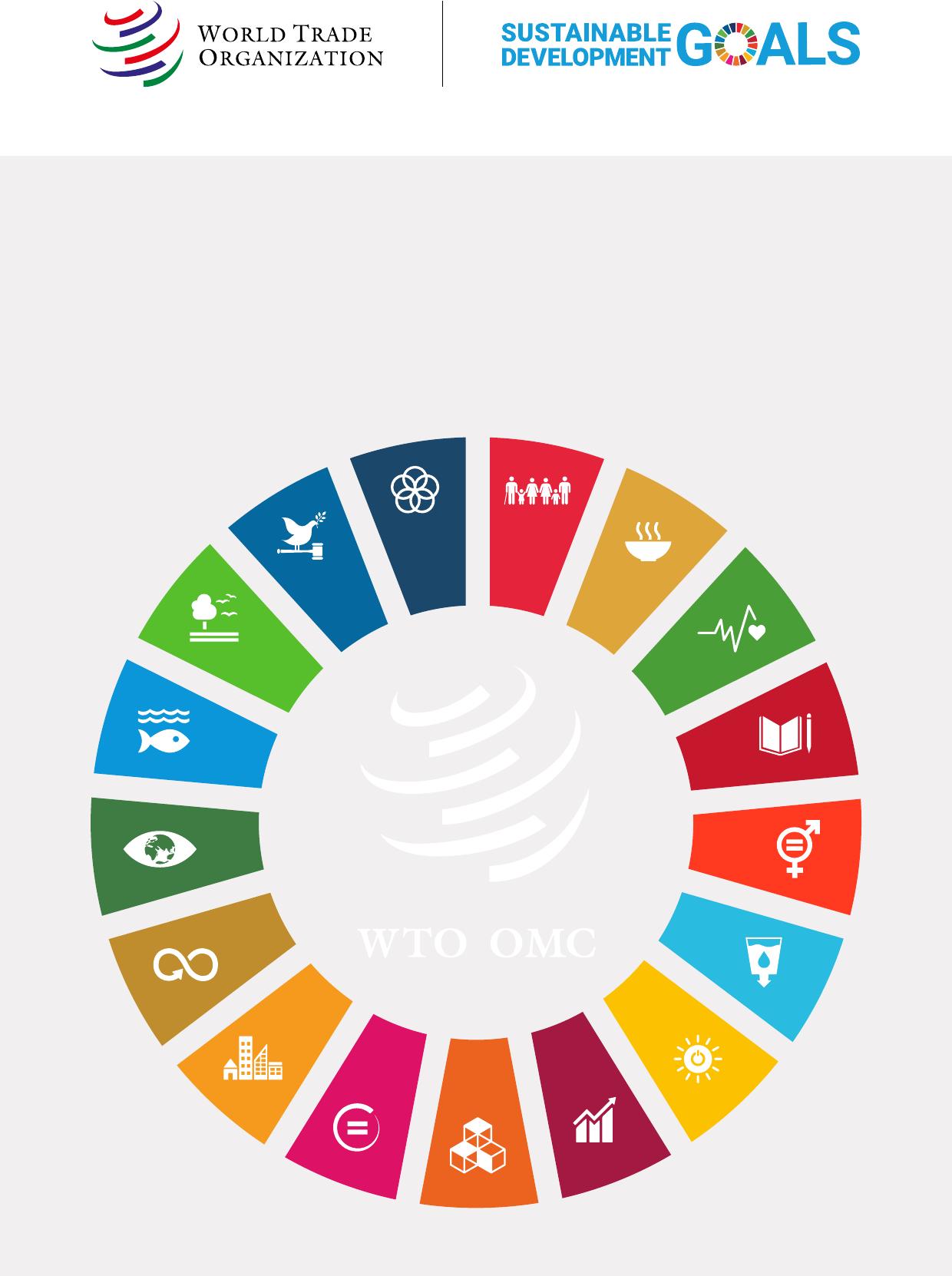WTO’scontributiontoattainingUNSustainableDevelopmentGoals:2023updatetotheHigh-LevelPoliticalForumAcknowledgmentsThispublicationreceivedguidancefromDeputyDirector-GeneralXiangchenZhangandfromYuvanBeedjadhuroftheOfficeoftheDirector-General.PreparationofthepublicationwasajointeffortacrossseveraldivisionsoftheWTO.RaúlTorres,HeadoftheDevelopmentPolicyUnitoftheDevelopmentDivisionconceptualized,anddirectedtheproject.RobertaAllport,alsofromtheDevelopmentPolicyUnit,wastheprojectcoordinator.ThepublicationwaseditedandreviewedbyHelenSwainoftheInformationandExternalRelationsDivision.ContributingauthorstothispublicationwereRaúlTorres,RobertaAllportandMagdalineMorijoi(DevelopmentDivision);RuosiZhang,EsterRubioColomer,AyushiSinghandMartinRoy(TradeinServicesandInvestmentDivision);SajalMathur,LudivineTamiottiandSvetlanaChobanova(TradeandEnvironmentDivision);JosefitaPardodeLeón,MengqiNiu,AntonyTaubman,CarolCraveroandRetoMalacrida(IntellectualProperty,GovernmentProcurementandCompetitionDivision);RobertaPiermartini,AnkaiXu,StelaRubínováandJose-AntonioMonteiro(EconomicResearchandStatisticsDivision).DisclaimerThispublicationhasbeenpreparedundertheWTOSecretariat’sownresponsibilityandwithoutprejudicetothepositionofWTOmembersandtotheirrightsandobligationsundertheWTO.ThedesignationsemployedinthispublicationandthepresentationofmaterialthereindonotimplytheexpressionofanyopinionwhatsoeveronthepartoftheWTOconcerningthelegalstatusofanycountry,areaorterritoryorofitsauthorities,orconcerningthedelimitationofitsfrontiers.3CONTENTIntroduction4The2023High-LevelPoliticalForumandtheWTO4Overviewofinternationaltradebetween2022and2023andprojectionsforthefuture4WTOcontributionstorecoveryfromCOVID-19andfuturepandemics7SDG6:CleanWaterandSanitation8Tradepoliciesandtrademeasuresforwaterconservationandmanagement8Watersupplyandsanitationservices9TheUN2023WaterConferenceandtheGlobalCommissionontheEconomicsofWater9Internationaltradeinwater10SDG7:AffordableandCleanEnergy11Tradeisincreasinglyshapingthecleanenergylandscape11Addressingtradebarriersincleanandrenewableenergy12Internationaltradecooperationcanspeedupaccesstoaffordablecleanenergyworldwide13SDG9:Industry,InnovationandInfrastructure15Governmentpoliciestopromoteinnovationandsustainability15ExamplesofWTOinitiativesthatfacilitateinnovation17TheroleofintellectualpropertyandtheWTOTRIPSAgreementininnovation17Policiesofmicro,smallandmedium-sizedenterprises20TheroleoftheAgreementonGovernmentProcurement(2012)ininfrastructuredevelopment20TheroleofAidforTradeinSDG921ThegeographicaldistributionofAidforTrade22Strengtheningmultilateralcooperationonindustrialsubsidies24SDG11:SustainableCitiesandCommunities26Theroleoftourismandservicesinsupportingthedevelopmentofsustainablecities26Measuringthesustainabilityoftourism27Theroleofinvestmentfacilitationfordevelopmentinthetourismsector27Theroleoftradeinpromotingsustainablecities28TheWTOTradeFacilitationAgreementandsustainablecities28SDG17:PartnershipsforTradeanddevelopment30References31Endnotes33WTO’SCONTRIBUTIONTOATTAININGUNSUSTAINABLEDEVELOPMENTGOALS4IntroductionThe2023High-LevelPoliticalForumandtheWTOTheUN’sHigh-LevelPoliticalForum(HLPF),heldannually,offersorganizations,includingtheWTO,theopportunitytoreviewprogresstowardstheattainmentoftheUNSustainableDevelopmentGoals(SDGs).InthecaseoftheWTO,thisinvolvesexaminingthecontributionofinternationaltradeandthemultilateraltradingsystemtoattainmentoftheSDGsandtodevelopmentingeneral.The2023HLPFwillfocusparticularlyonGoal6(“Cleanwaterandsanitation”),Goal7(“Affordableandcleanenergy”),Goal9(“Industry,innovationandinfrastructure”),Goal11(“Sustainablecitiesandcommunities”)andGoal17(“Partnershipsforthegoals”).TheHLPFwillalsotakeintoaccountthedifferentandparticularimpactsoftheCOVID-19pandemicacrosstheseSDGsandtheintegrated,andinterlinkednatureoftheSDGs.TheHLPFprocessthereforegivestheWTOtheopportunitytodelveintoSDGswhereconnectionswithtradehavenotbeenexaminedindetailuptonow.Overviewofinternationaltradebetween2022and2023andprojectionsforthefutureTheWTO’srecent“GlobalTradeOutlookandStatistics”report(WTO,2023a)showedthat,duetostrongexternalpressures,2023projectionsfortradeandoutputgrowtharebelowtherespectiveaveragesof2.6percentand2.7percentforthe12yearssincethetradecollapsethatfollowedtheglobalfinancialcrisis.TheWTOrecognizestheimportantrolethattrademustplayintheeconomicrecoveryfromtheCOVID-19pandemicandtheneedfordecisivepositiveactiononmultilateraltrade;asWTODirector-GeneralOkonjo-Iwealastatedduringthelaunchofthe“GlobalTradeOutlookandStatistics”:“Tradecontinuestobeaforceforresilienceintheglobaleconomy…Thismakesitevenmoreimportantforgovernmentstoavoidtradefragmentationandrefrainfromintroducingobstaclestotrade.Investinginmultilateralcooperationontrade…wouldbolstereconomicgrowthandpeople’slivingstandardsoverthelongterm.”1Thereportprojectsmerchandisetradevolumegrowthof1.7percentin2023,accompaniedbyrealGDPgrowthof2.4percentatmarketexchangerates(seeFigure1).However,thisprojectedmerchandisetradevolumegrowthis,infact,anupwardsrevisionfromthepreviousestimateof1.0percentmadebytheWTOinOctober2022,andisduetotherelaxationofCOVID-19pandemiccontrolsinChina,whichisexpectedtounleashpent-upconsumerdemandinthecountry,resultinginaboosttointernationaltrade.Thereportalsoshowsthatgoodstradewasmoreresilientthanexpectedformostof2022,despitetheeffectsofthewarinUkraine.Year-on-yearmerchandisetradevolumegrowthaveraged4.2percentinthefirstthree-quartersof2022,beforeasharpquarter-on-quarterdeclineinthefourthquarterdraggedgrowthfortheyeardownto2.7percent.Severalfactorscontributedtothatslump,includingelevatedglobalcommodityprices,monetarypolicytighteninginresponsetoinflation,andoutbreaksofCOVID‑19thatdisruptedproductionandtradeinChina.Tradegrowthin2022wasinlinewiththe2.4to3.0percentbaselinescenariopredictedbytheWTO’sMarch2022reportonthewarinUkraine(WTO,2022a),whichwaswellaboveamorepessimisticscenarioinwhichtheformationofcompetingeconomicblocswouldhaveresultedintradegrowthof0.5percent.Instead,asaresultofcontinuedopenmarkets,manyvulnerablecountrieswereabletocompensateforincreasedfoodpricesandreducedsupplybyturningtoalternativeproductsandsuppliers(WTO,2023b).Lookingaheadto2024(seeFigure2),areboundoftradegrowthto3.2percentisprojected,asGDPpicksupto2.6percent.However,thisestimateismoreuncertainthanusualduetothepresenceofanumberofsignificantrisks,includinggeopoliticaltensions,resurgentinflation,foodsupplyshocksandthepossibilityofunforeseeneffectsresultingfrommonetarytightening.Interestratehikesinadvancedeconomieshavealsorevealedweaknessesinbankingsystemsthatcouldleadtowiderfinancialinstabilityunlessaddressedbygovernmentsandregulators.Theoutcomeoftheworst-casescenariocontinuestobeafoodcrisisthatcouldtriggerwidespreadhungerand,potentially,politicalinstabilityinlow-incomecountries.InflationandcommoditypriceswerealsoamongthemaindragsontradeandGDPin2022(seeFigure3).CoupledwithanappreciationoftheUSdollar,inflationratesin2022wereamongtheirhighestsincethe1980s,stronglyinfluencedbymassivecommoditypricefluctuations,whichalsoaffected2022tradevolumes.INTRODUCTION5Figure1:WorldmerchandisetradevolumeandGDPgrowth,2015-24Annual%changeNote:2023and2024areprojections.Source:WTOformerchandisetradevolumeandconsensusestimatesforGDP(WTO,2023a).Figure2:Volumeofworldmerchandisetrade,2015Q1-2024Q4Seasonallyadjustedvolumeindex,2015=100Note:Theshadedregionrepresentsbothrandomvariationandsubjectiveassessmentofrisk.Sources:WTOandUNCTADforhistoricaldata,WTOSecretariatestimatesforforecastsandWTO(2023a).MerchandisetradevolumegrowthRealGDPgrowthatmarketexchangeratesAveragetradegrowth2010-2022AverageGDPgrowth2010-20222015–6.0–4.0–2.00.02.04.06.08.010.020162016201720182019202020212022P2023P2.33.11.42.84.93.43.23.30.42.6-5.1-3.39.45.92.73.01.72.43.22.680901001101201301402015Q12015Q22015Q32015Q42016Q12016Q22016Q32016Q42017Q12017Q22017Q32017Q42018Q12018Q22018Q32018Q42019Q12019Q22019Q32019Q42020Q12020Q22020Q32020Q42021Q12021Q22021Q32021Q42022Q12022Q22022Q32022Q42023Q12023Q22023Q32023Q42024Q12024Q22024Q32024Q4WTO’SCONTRIBUTIONTOATTAININGUNSUSTAINABLEDEVELOPMENTGOALS6ThesefluctuationswereparticularlystrongforEuropeannaturalgasprices,whichrose48percentbetweenJanuaryandAugust2022,beforefalling76percentbyFebruary2023.Pricesoffoodcommoditiesalsounderwentwidevariationsoverthecourseof2022,surgingby19percentbetweenJanuaryandMay,beforeplunging15percentbetweenMayandDecember.Pricesoffertilizersregisteredanevenlargeryear-on-yearincreaseof63percent.TheCOVID-19pandemicwasalsoresponsibleforadramaticreductionininternationaltrade,resultingindepressedGDPgrowth,particularlyin2020(seeFigure1).Conversely,internationaltradehasplayedacriticalroleinacceleratingtheeconomicrecoveryfromthepandemicinanumberofways:•Thepandemiccreatedasurgeindemandforgoodssuchasmasks,ventilatorsandpersonalprotectiveequipment.Internationaltradehelpedtoensurethattheseessentialmedicalsuppliesandequipmentwereavailableinthecountriesthatneededthemmost,evenwhendomesticproductionwasunabletomeetthedemand.•InternationaltradeplayedacriticalroleinthetransportofCOVID-19vaccinesandrelatedmedicalsuppliestocountriesinneed,includinglow-incomeeconomieslackingresourcestodeveloporpurchasevaccines.•Thepandemicdisruptedglobalsupplychains,causingshortagesanddelaysinthedeliveryofgoodsandservices.Internationaltradehelpedtomaintainthesesupplychainsandensuredthatessentialgoodsandservicescontinuedtoflowdespitedisruptions.•Thepandemiccausedasignificantdownturninglobaleconomicactivity,leadingtowidespreadjoblossesandbusinessclosures.Internationaltradehelpedtosupporteconomicrecoverybyenablingbusinessestoaccessnewmarkets,offsettingtheimpactofreduceddomesticdemand.•Internationaltradehelpedtofacilitateglobalcollaborationandcooperationinaddressingcommonchallengesbyenablingthesharingofknowledge,expertiseandresourcesacrossbordersandbypromotinginternationaldialogueandcooperation.Figure3:Globalaverageprimarycommodityprices,January2019-February2023Source:WorldBankandWTO(2023a).01002003004005006007008002019M012019M032019M052019M072019M092019M112020M012020M032020M052020M072020M092020M112021M012021M032021M052021M072021M092021M112022M012022M032022M052022M072022M092022M112023M01Index,2019=100EnergyCrudeOilNaturalGasFoodGrainsFertilizersINTRODUCTION7WTOcontributionstorecoveryfromCOVID-19andfuturepandemicsTheWTO’sworkhasbeeninstrumentalincreatingconditionsfavouringtherecoveryofinternationaltradeandeconomiesfromtheCOVID-19pandemic.AnimportantexampleistheWTO’s12thMinisterialConference(MC12),heldinJune2022followingadelayofovertwoyearsduetothepandemic.TheConferenceresultedintwooutcomesspecificallyrelatedtotraderesponsivenesstopandemics,namely,theMinisterialDeclarationontheWTOResponsetotheCOVID-19PandemicandPreparednessforFuturePandemics2andtheMinisterialDecisionontheAgreementonTrade-relatedAspectsofIntellectualPropertyRights(TRIPSAgreement).3TheMinisterialDeclarationontheWTOResponsetotheCOVID-19PandemicandPreparednessforFuturePandemicsresultedfromworkbyWTOmembersonaholisticmultilateralresponsetothepandemic,whichwouldalsotakeintoaccountfuturepandemics.ThisDeclarationissolutions-orientedand,forexample,willenablememberstobetterleveragetheknowledgegeneratedbythenetworksestablishedbyWTODirector-GeneralOkonjo-Iwealainordertocoordinatediscussionsamongrelevantinternationalorganizations,developmentagencies,civilsocietyandbusinesses.ThedeclarationcallsuponrelevantWTObodiestocontinueorinitiateworkonlessonslearnedandchallengesexperiencedduringthepandemic.Areasoffocusincludeexportrestrictions,foodsecurity,intellectualproperty,regulatorycooperation,services,tariffclassification,technologytransfer,tradefacilitationandtransparency.AyearlystocktakingexercisewilltakeplaceintheGeneralCounciluptotheendof2024.4TheMinisterialDecisionontheTRIPSAgreementprovidesaplatformformemberstoworktogethertodiversifyvaccineproductioncapacity.Itallowsmembersgreaterscopetotakedirectactiontooverridetheexclusiveeffectofpatentsthroughatargetedwaiverthataddressesspecificproblemsidentifiedduringthepandemic,especiallyfacilitatingandstreamliningvaccineexportsforthenextfiveyearsandgreaterclarityregardingemergencyusemeasures.Developing-economymemberswithexistingCOVID-19vaccinemanufacturingcapacityareencouragedtooptoutofavailingthemselvesofthewaiver.MemberswerealsoduetodecideonwhethertoextendthewaivertocovertheproductionandsupplyofCOVID-19diagnosticsandtherapeuticsbyDecember2022,thoughthisdeadlinehasbeenextended.8WTO’SCONTRIBUTIONTOATTAININGUNSUSTAINABLEDEVELOPMENTGOALSTradepoliciesandtrademeasuresforwaterconservationandmanagementWaterisassumedbymanytobeprovidedbynatureandavailabletoallforfree,but,inreality,wateraccesscannotbetakenforgranted.Waterresourcesaredistributedunevenlyacrosstheglobe.Furthermore,itssupplyissignificantlyaffectedbyclimatechange,deforestation,andpollution.Tradeandtradepoliciescanplayaroleinaddressingthesechallenges,especiallyineconomiesmostvulnerabletoextremeweatherevents,waterorfoodscarcityandclimateshocks.Asdevelopedfurtherinthe2022WorldTradeReport,theremovalofunnecessarybarrierstotradecouldsignificantlyaugmentthepotentialoftrade,finance,investmentandaccesstotechnologies,andcouldhelpreducecostsandexposuretoclimate-inducedshocks(WTO,2022b).Tradecanfacilitatethedevelopmentanddeploymentofgoods,servicesandtechnologies,suchasdrought-resistantcropvarieties,driporotherirrigation,andwaterconservationandstoragesystems.ThereisWTOinterestininitiativesonenvironmentalgoodsandservices,and74WTOmembersareactivelyengagedintheTradeandEnvironmentalSustainabilityStructuredDiscussions.Tradeinenvironmentalproductscouldcontributetothediffusionofwaterresourcemanagementandconservationtechnologiesandproducts,includingthedesign,construction,installationorprovisionoftechnologiesandproductsrelatedtowatersupply.Itmayalsosupportwaterpollutionmanagementtechnologiesandproducts,suchasthoseneededforwastewatertreatmentmanagementandfortacklingwaterpollution(MullerandBellmann,2016;WTO,2022b).TheWTOEnvironmentalDatabase(EDB)5isarepositoryofWTOmembers’environment-relatednotificationsandinformationdrawnfromtheirtradepolicyreviews.6Between2009and2021,1,486trademeasureswerenotifiedandtaggedintheEDBwiththeenvironment-relatedobjectiveof“waterconservationandmanagement”.WTOmembershavemostlydeployedsupportmeasures,intheformofgrantsandnon-monetaryinitiatives(27.1percentand26.8percent,respectively,ofthenotifiedmeasures)toincentivizeeffectivemanagementofwaterresources.With70–80percentoftheworld’sfreshwaterallocatedtoagriculturalpurposes,thereisastrongfocusonagriculture,withmorethanhalfofsuchtrademeasuresforwaterconservationormanagement(52.3percent)notifiedundertheWTOAgreementforAgriculture,andtherestbeingnotifiedundertheWTOAgreementonSubsidiesandCountervailingMeasures(22.8percent)andtheWTOTechnicalBarrierstoTrade(TBT)SDG6:CleanWaterandSanitationKEYPOINTS•Tradecanprovidethemeanstodisseminatethetechnologiesneededforbetterwatermanagement.Itcanhelptoscaleupsolutionsandspreadbestpracticeswithregardtowatermanagementasgoodsproducersconnectthroughsupplychains.•Tradeinwaterservicescanhelpattracttheinvestmentsneededtobuildormaintainpublicwatersupplyandsanitationutilities.Tradecanalsoprovideaccesstoinnovativeandcompetitivetechnologiesthatincreasetheefficiencyofsanitationandwastewatermanagement.•WTODirector-GeneralOkonjo-IwealaparticipatedintheUNWaterConferenceinMarch2023andisaco-chairoftheGlobalCommissionontheEconomicsofWater.•Whilewateritselfismostlynottraded,indirecttradeinwater–particularlyasembeddedintradedagriculturalgoods–canplayanimportantroleinsavingwaterresourcesandenhancingfoodsecurity.SDG6:CLEANWATERANDSANITATION9Agreement(21.7percent)anddealingwithtechnicalspecifications,standards,andconformityassessmentprocedures.Measurestakenbydevelopingeconomiesandleast-developedcountries(LDCs)accountfor43.8percentofthenotificationstaggedonwaterconservationandmanagement.TheEnhancedIntegratedFramework–apartnershipofeconomies,donorsandpartneragencies,includingtheWTO,thatassistsLDCs–andtheWTOAidforTradeinitiativeincludeprojectstohelpcountriesmobilizesupportandbuildtrade-relatedcapacitiesforinitiativessuchasclimateadaptation,irrigationandwaterconservationandmanagement.ExamplesofsuchprojectsaretheprovisionofgreenhousesandhailnetstosmallfarmersinLesothotopromoteresiliencetochangingweatherpatterns,andmappinglandslideriskandpromotingsustainablesoilandwatermanagementinTimor-Lestetoenhancecoffee-growingcommunities’adaptationtoandpreparednessforclimatechange(WTO,2022b).Thus,thereisamplescopetoexaminehowtradepolicycanimprovetheeconomicsofwaterrights.Inmanysectors,tradedistortionsarealsoeconomicdistortions,andthereisneedforcoherencebetweentradeandeconomicpolicies.Trademayalsobekeytoadaptationasitdirectly–orindirectly,throughtradeinembeddedagriculturalorotherproducts–allowsformovementofwaterresourcesfromareaswithsurplustothosefacingscarcity.WatersupplyandsanitationservicesServicesplayasignificantroleinthesustainablemanagementofwaterandsanitation,whichconcernsnotonlythesupplyofwaterservicesperse,butalsovariousotherrelevantservices.Waterservicesconsistofthesupplyofwaterforconsumptionandthetreatmentofwastewater,andwatersupplyinvolvesthecaptureoftheresource,itstreatmenttoreachadeterminedlevelofquality,transportationthroughaprimarynetwork(aqueductsormains)anddeliverytousersthroughasecondarynetwork(pipelinesandtaps).Wastewaterservicesentailtheremovalofsewagethroughpipesanddrainsanditschemical,physicaland/orbiologicaltreatmenttoremovecontaminantsandmakethewatercontentavailableforreuseorreleaseintotheenvironment.Thesupplyofwaterservicesentailsthebuildingofinfrastructureandtheoperationofspecializedprocesseswithcomplextechnologies,whichnecessarilyimplicateawiderangeofotherservicesincludingdesign,engineeringandconstruction,installation,maintenanceandrepair,andtechnicalanalysisandtestingservices.Giventhatwaterservicesrequirecostlyinfrastructure,mostofwhichislaidundergroundandentailslarge,fixedcosts,waterservicesaretraditionallyoperatedbylocalpublicauthorities,andthescopefortheintroductionofcompetitionismorelimitedthanforotherinfrastructureservices,suchastelecommunications.Thelasttwoorthreedecadeshaveseentheincreaseofprivateinvestmentinthewatersectoracrosstheglobe.Theinvolvementoftheprivatesectorcantakeseveralforms,rangingfrompublic-privatepartnerships(PPPs)tofullprivatization.Inthiscontext,tradeinwaterservices,inparticularthesupplyofwaterservicesinvolvingforeigndirectinvestment(correspondingtomode3oftheGeneralAgreementonTradeinServices(GATS)modesofsupply),7hasgainedmoreroomtodevelop.8DevelopingeconomiesfacingchallengesofsustainabilityandfinancialviabilitymayconsiderPPPsasanoptiontoimprovetheirwatersupplyandsanitationservices.Inthiscontext,tradeinwaterservicescanhelpbringininvestmentneededforthebuildingormaintenanceofpublicutilities.Tradecanalsoprovideaccesstoinnovativeandcompetitivetechnologiesthatincreasetheefficiencyofsanitationandwastewatermanagement.TheUN2023WaterConferenceandtheGlobalCommissionontheEconomicsofWaterTheUN2023WaterConference,9whichwasco-hostedbytheNetherlandsandTajikistaninMarch2023,markedawatershedmoment.Followingagapofnearly50years–theonlypreviousUNWaterConferencehavingbeenheldin1977–globalleadersandkeypolicymakersengagedonwater.OneofthemainoutcomesfromtheUN2023WaterConferencewastheWaterActionAgenda,10whichcollectedover700commitmentsfrommemberstates,inter-governmentalorganizations(IGOs),non-governmentalorganizations(NGOs)andotherstakeholders.WTODirector-GeneralOkonjo-IwealaparticipatedinthePlenaryInteractiveDialogue11oftheUN2023WaterConferenceonthesubjectofWaterforSustainableDevelopment,aswellasinanumberofotherhigh-levelevents.Director-GeneralOkonjo-Iwealaalsoengagedwiththemediaandwithotherstakeholdersinhercapacityasco-ChairoftheGlobalCommissionontheEconomicsofWater.12AttheUN2023WaterConference,theCommissionpublisheditspreliminaryfindingsin“TurningtheTide:ACalltoCollectiveAction”(Mazzucatoetal.,2023),abasisforitsfinalreport,whichistobepublishedinMay2024.10WTO’SCONTRIBUTIONTOATTAININGUNSUSTAINABLEDEVELOPMENTGOALSInternationaltradeinwaterWateritselfismostlynottraded,atleastnotdirectlyinlargevolumesorvalues.Thereis,however,growinginterestinindirecttradeinwater,particularlyasembeddedintradedagriculturalgoods.AmongthethousandsofgoodstradedandlistedintheHarmonizedSystem(HS)ofcommodityclassificationusedtocodifyinternationaltradeandtariffs,onlyHS2201(Waters,includingnaturalorartificialmineralwatersandaeratedwater(…);iceandsnow)isexplicitlyatradedproduct,withamerchandiseexportvolumeof871billionlitresor926billiontonnes,andmerchandiseexportvalueofUS$3.7billionin2020,accordingtotheUNComtradeDatabase.13ThetopfiveexportersareFrance,China,Italy,theUnitedStatesandBelgium,andthetopfiveimportersaretheUnitedStates,HongKong(China),Belgium,GermanyandJapan.Globally,theaverageWTOboundceilingtariffandtheactualappliedtariffonbeveragewaters(HS220110)are53percentand22percent,respectively(WTO,2022c).However,thistradeinwaterdoesnotimplythatfreshwatersuppliesareevenlydistributedglobally.Thereareeconomies,orregionswithineconomies,withwaterscarcity,andotherswithwaterabundance.Internationaltradecouldpotentiallyhelptoalleviatelocalproblemsofwaterscarcitybymovingresourcestowheretheyaremostneeded,butforeconomic,politicalorenvironmentalreasons,economiesmaybeunableorunwillingtodoso.Large-scaleshipmentsofwaterareessentiallynon-existent.Reasonsforthelackofthistradearealsotechnical,aswaterisbulkyanddifficulttotransport(WTO,2010;Temmerman,2017).Thereisalsotheconceptofvirtualwatertrade.Intheory,tradein“virtualwater”wouldsuggestthatcountriesfacingfreshwaterscarcitycouldimportmorewater-intensiveproductsandexportlesswater-intensiveproducts.However,tradinginvirtualwatercanalsoenhancewaterinequalitiesifwater-scarcecountriesdecidetoexportwater-intensivecommoditiesthemselves.Itcanalsocreatetheriskofmaladaptationunlesscountriesfullyaccountfortheopportunitycostsoffreshwateruse.Themainuseroffreshwateristheagriculturesector,whichaccountsfor70–80percentofglobalwateruse.Importingwater-intensivecommodities,insteadofproducingthemwithlocalwater,couldthereforebeconsideredasanintegralpartinpoliciesthataimtoincreasefoodsecurityandnutritioninwater-constrainedcountries.Globally,virtualwatertradecouldplayanimportantroleinsavingwaterresourcesandenhancingfoodsecurityiftradeflowsaredirectedfromregionswithhigherwaterproductivitytothosewithlowerproductivity.Estimatessuggestthattradeinagriculturalproductsresultsinwatersavingof369billioncubicmeters,equivalentto4percentofglobalwateruse.14Somestudiesshowsmalltosubstantialincreasesinglobalvirtualwaterflowsowingtotradeliberalization,withincreasingimportsofwater-intensivegoodsandshiftstolesswater-intensiveactivitiesbywater-scarceregions,andincreasedwater-intensiveexportsbyrelativelywater-abundantregions(FAO,2022).However,moststudiesontherelationshipbetweeninternationaltradeandnationalwaterendowmentsdemonstratethatotherfactors,suchaslabour,capital,landendowmentandaccesstoarableland,farmingstructure,technologyandagriculturalpoliciesaremoreimportantthanwateravailabilityindeterminingagriculturalandvirtualwatertradepatterns(FAO,2022).Anotherlimitingfactorintheconceptofvirtualwateristhefactthatthepriceoffreshwaterusedinagricultureorothersectorsgenerallydoesnotreflectitseconomicvalue,northeenvironmentalexternalitiesassociatedwithitsuse.Thisdistortioncanleadtosub-optimaldistributionofproductionandinternationaltradeflowsfromaneconomicandanenvironmentalpointofview.Aligningtradeandsustainablewateruseisthereforealsocriticalinordertoimproveglobalwatergovernance.SDG7:AFFORDABLEANDCLEANENERGY11TradeisincreasinglyshapingthecleanenergylandscapeEnvironmentalgoods,servicesandtechnologies,whichhelptoproducecleanerandrenewableenergyandimproveenergyefficiency,arecriticaltothetransitiontoalow-carboneconomy.Locallygeneratedrenewableenergycanallowdevelopingandleast-developedeconomiestobypassmanyofthelogisticaldifficultiesandhighcostsinvolvedinthetransmissionanddistributionoffossilfuelenergy,improvingtheirenergyaccessandreducingtheirdependenceonenergyimports.Thecleanenergyindustryisadynamicandfast-growingsector,althoughitisstillemerginginmanycountries.Thescopeofgoodsandservicesrelatedtocleanenergyandenergyefficiencyisbroadandincludesequipmentandtechnologiesthatproducewind,solar,hydro,geothermalandbiomassenergy,thatminimizeenergyuseandthatimproveheatandenergymanagement.Tradepromotesthedevelopmentandadoptionofcleanandrenewableenergyequipmentandofenergy-efficientgoodsandservices.Basedonanillustrativelist,itisestimatedthatglobaltradeinrenewableenergyequipmentandproductsgrewbyover180percentbetween2000and2020,outpacingtheannualgrowthrateofoverallmerchandisetrade.Economiesofscale,innovation,andtheriseofglobalvaluechainsdriveimprovementsinmanylow-carbontechnologies.Forexample,improvementsintechnologyandproductionhavedrivendownthecostofsolarelectricityby97percentsince1990(seeFigure4).Asignificantpartofthiscostdeclinehasbeenattributedtoglobalvaluechains,whichhaveenabledproducerstolowerproductioncostsandreapeconomiesofscalebylocatingdifferentproductionstagesindifferentcountries(WTOandIRENA,2021).Thecapacityofsolarpanelsgloballytradedin2017reachedalmost80GW–theequivalentofmorethan9percentofglobalelectricitygeneration(Wangetal.,2021).Althoughmanynewenvironmentaltechnologiesaredevelopedinhigh-incomeeconomies,theproductionofmanycleanenergyandenergyefficiencygoodsandservicesisincreasinglyspreadacrossalleconomies.Regionalandglobalvaluechainsoffermanyeconomies,includingdevelopingones,anopportunitytoparticipatebysupplyingSDG7:AffordableandCleanEnergyKEYPOINTS•Tradeinenvironmentalgoodsandservicescanplayanimportantroleinthetransitiontoalow-carboneconomybysupportingthedevelopment,deploymentanddiffusionofaffordablelow-carbonandenergy-efficienttechnologies.•Openinguptradeincleanerandrenewableenergyproductsandinenergy-efficientproductscouldraiseglobalexportsofthesegoodsby5percentby2030.Althoughthiswouldalsoraisethedemandforenergy,andthusincreasecarbonemissions,theeliminationoftariffsandthereductionofnon-tariffmeasureswouldneverthelessleadtoa0.6percentnetreductioninglobalcarbonemissionsby2030.•Internationaltradecooperationplaysanimportantroleinfacilitatingtradeandinvestmentinaffordableandcleanenergyproductsandservices.However,addressingthetradebarriersthathindertheadoptionanddiffusionoflow-carbonandenergy-efficienttechnologiesrequiresgreatercooperationattheregionalandmultilaterallevels.12WTO’SCONTRIBUTIONTOATTAININGUNSUSTAINABLEDEVELOPMENTGOALSparts,componentsandservicestoproduce,distributeandmarketmanycleanenergyandenergyefficiencytechnologies.Forinstance,China,MalaysiaandVietNamaremajorexportersofsolarpowerproducts,includingsolarpanelsandsolarwaterheaterdevices.Tradeinenvironmentalservicescanalsosupporttheuptakeofcleanenergyandenergyefficiencytechnologies.Manycleanenergyandenergyefficiencyservicesarecloselylinkedwithcleanenergyandenergyefficiencygoods,sincetheprovisionoftheseservicesoftenreliesontheuseofrelatedenvironmentalgoods.Thisisalsotrueofotherancillaryservicesessentialforcleanenergyandenergyefficiencytechnologies,suchasresearchanddevelopment,engineeringandconstruction,distributionandtransport,andthesale,delivery,installationandmaintenanceofequipment.Forinstance,morethan70percentoflabourforsolarphotovoltaicdeploymentisconcentratedininstallation,gridconnection,operationandmaintenanceservices(IRENA,2017).Tradeinrenewableenergyandelectricitycanalsohelptomakeproductionprocessescleanerbyprovidingaccesstoaffordablesustainableandrenewableenergysources.Internationaltradeinrenewableenergyandelectricitycanhelptocompensatefortheunevengeographicaldistributionofusablesunlightandwind,thoughthishingesonimportanttechnologicalbreakthroughs,notablyinenergystorage.Moredevelopingeconomiesarealreadymovingtoharnesstheirabundantrenewableenergypotential.Forinstance,Moroccohoststheworld’slargestsolarpowerstation,whileEgyptisbuildingasolarphotovoltaicpark,toutedtobecometheworld’slargest.AddressingtradebarriersincleanandrenewableenergyWell-designedclimatepoliciesareessentialtoencouragethemarket,investorsandconsumerstomakemorelow-carboninvestmentandconsumptiondecisions,includingwithrespecttoenergy.Inthiscontext,internationaltradeandtradepoliciescancontributetoenablingaccesstoanddevelopmentanddeploymentofcleanenergyequipmentandenergy-efficientgoodsandservices.Conversely,barrierstotradeincleanandrenewableenergyequipmentandenergy-efficientgoodscanbesignificant.Theaverageimport-weightedappliedtariffsonanillustrativelistofrenewableenergyequipmentremainrelativelylow,rangingfromaround2.4percentinhigh-incomecountriesto8.3percentinlow-incomecountries.However,theseaveragesmasktariffpeaksashighas50to80percentappliedbysomeeconomiesonsomeoftheseproducts.Inaddition,anincreasingnumberFigure4:Assolarphotovoltaic(PV)panelexportsrise,theirpricefallsSource:WTO(2022b).ImportsofsolarPVpanels(cellsandmodules)AveragesolarPVmoduleprice87965432119901995200020052010201520200900800700600500400300200100TradeinsolarPVpanelsinrealUS$million(2015)0SolarPVmodulepriceinrealUS$(2015)perwattSDG7:AFFORDABLEANDCLEANENERGY13ofantidumpingdutiesandcountervailingmeasures–sometimesexceeding100percent–havebeenappliedtosomeoftheseenvironmentalgoods.Informationabouttraderestrictionsonenvironmentalservicescanbelimited,andrestrictivenationalregulations,suchasprofessionalqualificationsandimmigrationrules,canhinderthedelivery,installationandmaintenanceofcleanandrenewableenergyandenergy-efficientequipmentineconomieswithlimiteddomestictechnicalcapacities.Openinguptradeinenergy-relatedenvironmentalgoodswouldraiseglobalexportsofthesegoodsby5percentby2030,aswellasraisingglobalGDPbyreducingdistortionsandincreasingproductivity.AccordingtoWTOsimulations,theeliminationoftariffsanda25percentreductionintheadvaloremequivalentofnon-tariffmeasuresonenergy-relatedenvironmentalgoodswouldincreasetradeinenergy-relatedenvironmentalgoodsinrealtermsbyUS$109billion(Bacchettaetal.,2022).Whileopeninguptradeinenergy-relatedenvironmentalgoodswouldincreaseoveralleconomicactivityandglobalGDPbyraisingthedemandforenergyandtransport,thusincreasingcarbonemissions,WTOsimulationsindicatethattheneteffectwouldactuallybeasmallreductioninglobalcarbonemissionsof0.58percentrelativetothebaselineby2030.Thisprojectedfallcapturesonlycarbondioxide(CO2)reductionsresultingfromincreasedenergyefficiencyandreplacingnon-renewableenergysourceswithrenewableones.FurtherCO2reductionscanbeachievedthroughtheknock-oneffectsofacceleratingthespreadofenvironmentalinnovation,includingbyincreasingthedemandforancillaryservicesrelativetothesale,delivery,installationandmaintenanceofcleanenergyandenergyefficiencytechnologies,whichwoulddrivedownthecostsofcleanenergyandofenergyefficiencytechnologies,therebyprovidingeconomieswithgreateropportunitiestoadaptcleanenergyandenergyefficiencytechnologiestotheirlocalneeds.Ambitious,credibleandtimelyclimatepoliciescanincreasethecontributionoftradeincleanenergygoodsandservicestothetransitiontoalow-carboneconomy.Thedevelopment,adoptionandsupplyofcleanenergytechnologiesalsorelyonwell-targetedandadequatelyfinancedinvestmentintowell-functioningqualityenergyinfrastructure.Policiestoreduceuncertaintiessurroundinglow-carboninvestmentsareessential.InternationaltradecooperationcanspeedupaccesstoaffordablecleanenergyworldwideInternationaltradecooperationplaysacriticalroleinfacilitatingtradeandinvestmentincleanenergyequipmentandinenergy-efficientgoodsandservices.Addressingthebarriersthathindertheadoptionanddiffusionoftheseenvironmentaltechnologiesrequirestradecooperationattheregionalandmultilaterallevels.Regionaltradeinitiativesandagreementshavebeenthemainavenuetopromotetradeincleanenergyandenergy-efficientgoodsandservices.In2012,membersoftheAsia-PacificEconomicCooperation(APEC)agreedtoreducetheirrespectiveappliedtariffratesto5percentorlessbytheendof2020onasetof54environmentalgoods,includingsolarpanelsandwindturbines.Facilitatingandpromotingtradeandforeigndirectinvestmentincleanenergyandenergy-efficientgoodsandservicesarealsoexplicitlyaddressedinanincreasingnumberofregionaltradeagreements.Atthemultilaterallevel,WTOdisciplinesensurethattradeincleanenergyandenergy-efficientgoodsandservicesflowsaspredictableandfreelyaspossible.WhilepastmultilateralandplurilateralnegotiationsattheWTOwereinconclusive,cleanenergyandenergy-efficientgoodsandservicesbenefittedfromtrade-openingaspartoftheUruguayRoundestablishingtheWTO.Inaddition,tradeincleanenergyandenergy-efficientgoodsandservicesisfosteredbythenon-discriminatory,transparentandpredictabletradeenvironmentunderpinnedbyWTOrules.Forinstance,theAgreementonTechnicalBarrierstoTrade(TBTAgreement)ensuresthattechnicalregulations,standardsandconformityassessmentproceduresoncleanenergyandenergy-efficientgoodsdonotcreateunnecessaryobstaclestotradeandarebasedonrelevantinternationally-agreedstandards.Theprotectionandenforcementofintellectualproperty(IP)rightsundertheWTOAgreementonTrade-RelatedAspectsofIntellectualPropertyRights(TRIPSAgreement)arealsoessentialtosupportinnovationincleanenergyandenergy-efficienttechnologies,whilealsopromotingthetransferoftechnology.DiscussionsamongWTOmemberscontributetoincreasedtransparencyandcooperationoncleanandrenewableenergy.AttheWTOCommitteeonTradeandEnvironment,membersaddressissuesattheintersectionbetweentradeandtheenvironment,exchanginginformationaboutnationalrenewableenergyandenergyefficiencyprogrammes,aswellasregionalinitiativestopromotecleanenergy.14WTO’SCONTRIBUTIONTOATTAININGUNSUSTAINABLEDEVELOPMENTGOALSFurthermore,followinguponyearsofproductivediscussionsintheCTE,theFossilFuelSubsidyReform(FFSR)initiativewasofficiallylaunchedinDecember2021andcurrentlycomprises48WTOmembers.TheinitiativeseekstorationalizeandphaseoutinefficientfossilfuelsubsidiesthatencouragewastefulconsumptionandencouragesmemberstoshareinformationandexperiencestoadvancediscussionsattheWTO.TheWTOcouldmakeagreatercontributiontopromotingtradeincleanenergyandenergy-efficientgoodsandservicesbyadvancinginitiativespursuedbydifferentgroupsofWTOmembers.Forexample,participantsintheTradeandEnvironmentalSustainabilityStructuredDiscussions(TESSD)exploreopportunities,bestpracticesandpossibleapproachesforfacilitatingtradeinenvironmentalgoodsandservices.TheFFSRinitiativealsoseekstorationalizeandphaseoutinefficientfossilfuelsubsidiesthatencouragewastefulconsumption.WTOmemberscouldturnthesediscussionsintoconcreteactionswhichfostertradeincleanenergyandenergy-efficientgoodsandservices.SDG9:INDUSTRY,INNOVATIONANDINFRASTRUCTURE15GovernmentpoliciestopromoteinnovationandsustainabilityInmanyeconomies,governmentshaveimplementedpolicieswiththeobjectiveofimprovingthebusinessenvironmentortiltingthestructureofeconomicactivitytowardsectors,technologiesortasksthatareexpectedtoofferbetterprospectsforeconomicgrowthorsocietalwelfarethanwouldoccurintheabsenceofsuchintervention.Governmentsgenerallyjustifytheadoptionofsectoral-levelpoliciesinordertofosterlong-termgrowth,increaseincomesandproductivity,and,indoingso,promoteentrepreneurship,innovation,technologytransfer,skilldevelopmentandcompetition.Innovationpolicieshaveshiftedwiththeevolvinglandscapeoftechnologies.Initially,industrialpolicieswerenarrowlydefinedaspoliciesthataimedtobuildcapacitymainlyinthemanufacturingsector.Today,digitalizationisoneoftheprimarydriversinspurringinnovationandproductivityinfieldssuchasscience,technologyandmedicine–forexample,thecurrentwaveofdigitalgeneral-purposetechnologiesSDG9:Industry,InnovationandInfrastructureKEYPOINTS•Governmentsareadoptingandimplementingpoliciesaimedatsupportingthecreationoffruitfulinnovationecosystems,technologytransferandindustrialization.Domesticintellectualpropertyregimescanbetailoredtosupportthepolicyobjectivesofdifferenteconomies,andatthesametimecanprovidethenecessarycertaintyandpredictabilitytotheinnovationecosystem.•TheWTOAgreementonTrade-RelatedAspectsofIntellectualPropertyRights(TRIPSAgreement)playsacrucialroleinpromotinginnovationbyincentivizingcreators,protectingtheirrights,facilitatingtechnologytransfer,encouraginginvestment,fosteringcompetition,andestablishinginternationalstandardsforintellectualpropertyprotectionandenforcement.•Governmentprocurementofconstructionservicesiskeytoimprovingpublicinfrastructure.TheWTOplurilateralAgreementonGovernmentProcurement(GPA2012)providesaframeworkfortheconductofgovernmentprocurementandhelpitspartiestoattractinvestmenttoboostpublicinfrastructure.•AidforTradeplaysasignificantroleinsupportingtheindustrialization,innovationandimprovementoftradeinfrastructureindevelopingeconomies.AidforTradedisbursementsincreasedduringthepandemic,reachinganall-timehighofUS$48.7billionin2020andsupportedprojectsthatprioritizedbuildingproductivecapacityandeconomicinfrastructure.•Therehasbeenanincreaseintheuseofsubsidiesandnewdevelopmentsthatunderpincurrentindustrialpolicyhaveexposedcertaingapsintheexistingrules.Therefore,tomaintainthetransparency,openness,andpredictabilityofthemultilateraltradingsystemitisimportanttoincreasemultilateralcooperationonsubsidies.16WTO’SCONTRIBUTIONTOATTAININGUNSUSTAINABLEDEVELOPMENTGOALSincludesartificialintelligence(AI),predictivetechnologies,highlysophisticatedautomationandbigdata(WIPO,2022a).Manycountriesaimtomodernizetheireconomies,includingtheirtraditionalmanufacturingsectors,inawaythatpromotestheshiftfrommechanicalandanalogueproductiontodigitally-enabledproductionprocessesandservices.Increasingconcernsaboutenvironmentaldegradationandclimatechangehavegivenrisetogovernmentinterventionstodirecttheeconomytowardsagreengrowthpath.Thepolicytoolstoaddresssustainabilityissuescanincludecommand-and-controlmeasures(i.e.,regulatorymeasuresorprohibitionofcertainproductsandpractices),market-basedinstruments(e.g.,carbonpricing,governmentsupportandgovernmentprocurement),informationinstrumentstoprovideenvironment-andenergy-relatedinformationtoallowforinformedchoices,andvoluntaryagreements.Openandtransparenttradepolicieshavealsocontributedtothedevelopmentandthespreadofenvironmentallyfriendlyandlow-carbontechnologies.Theshifttolow-carbonfarming–especiallyclimate-smartagriculturetechniquesthatfocusonintercropping,croprotation,agroforestryandimprovedwatermanagement–couldbringfurtherbenefitstodeveloping-economyfarmersintermsofimprovedproductivity,greaterresilience,lessdeforestation,andreducedrelianceonfertilizersandfuels(WTO,2022b).Inshort,thediffusionoflow-carbontechnologiescanprovidepoorereconomieswiththetoolstheyneedbothtolimitcarbonemissionsandtoacceleratetheirdevelopment.Asthesteelindustryworkstowardcarbon-neutralproduction,theWTOcanhelpittolowercostsandreducepotentialtradefragmentationbyfacilitatingcoherenceandtransparencyindecarbonizationstandards.15Thetransitionofthesteelindustryandinvestmentsinbreakthroughsteelmakingtechnologies,inlinewithdecarbonizationstandards,canpresentnewopportunitiesfordevelopingeconomies.Newsupplychainsmayopenassteelmakingshiftstonear-zeroemissiontechnologies,andasnewinputssuchasgreenhydrogenandthenaturalcomparativeadvantageofdevelopingeconomiescouldbeexploitedtoallowthemtointegrateintothesenetworks(IEAetal.,2022).Forexample,thereispotentialforSouthAfricatoenterintogreenprimaryironproductionvaluechains(Trollipetal.,2022).Harmonizingdecarbonizationstandardsacrosstheironandsteelvaluecanbebeneficialfordevelopingeconomiestoexploitthesenewopportunities.CASESTUDYThesteelindustryItisworthnotingthereisnoone-size-fits-allapproachtoinnovationpolicy.Differentsetsofpoliciesarerelativelymoreappropriateforcountriesatdifferentlevelsofeconomicdevelopment.Atearlystagesofdevelopment,governmentsmayfavourinvestment-basedstrategies,whilehome-growninnovationbecomesmoreimportantasaneconomygrowsandapproachestheworldtechnologyfrontier(i.e.,themostrecenttechnologicalinnovations).Coupledwithopenandcompetitivemarkets,innovationpolicycanhelpcountriestoescapethemiddle-incometrap(i.e.,thefailureofacountrytotransitionfromamiddle-incometoahigh-incomeeconomybecauseofrisingcostsandadeclineincompetitiveness)byfosteringthemostinnovativeentrepreneurs.However,inindustriesandfirmsfarfromthetechnologyfrontierthathavenotyetadoptedthemostrecenttechnologicalinnovations,productivityismorelikelytobespurredbyimprovementsinmanagementpractices.Likewise,investmentinprimaryandsecondaryeducation,forexample,isrelativelymoreeffectivecomparedtoinvestmentinhighereducationindevelopingeconomies.Othergovernmentpoliciescanbebeneficialforinnovation.Theeconomicliteraturehighlightsthatresearchanddevelopmenttaxcreditstendtoincreaseresearchanddevelopmentspendingand,insomecases,increasepatentingactivity.Governmentresearchspendingandprocurementhaveagenerallypositiveimpactoninnovation.Recentresearchshowsthatpublicfundingofuniversityresearchleadstomorepatentsbeingfiledbyprivatefirms.16Governmentresearchgrantsallocatedinacompetitivewaytoprivatefirmsgenerallysucceedinstimulatingprivateresearchanddevelopment.Theeffectisparticularlyprevalentforsmallfirms,whicharemorelikelytoexperienceexternalfinancialconstraints.Governmentscanalsohavealargeimpactoninnovationthroughprocurementpolicies,especiallythosedirectedtowardssectorsandfirmswithhightechnologicalcontent.Education,inparticularinscience,technology,engineeringandmathematics(STEM),isassociatedwithhigherlevelsofinnovationactivities.PoliciestoincreasethesupplyofSTEMgraduatesandSDG9:INDUSTRY,INNOVATIONANDINFRASTRUCTURE17attracthighlyskilledimmigrantshavebeenshowntoboostinnovation.Highlyskilledscientistsandengineersfromdevelopingeconomieswhoworkabroadcanalsogeneratenetpositivegainsintheirhomecountrieswhentheyreturnbackorfostercollaborationwithlocalentrepreneurs.Promotingcompetitivemarketsisgenerallybeneficialtoinnovation.Studieshaveshownthatmarketentrybarriersraisedbyproductmarketregulationreducetheintensityortheefficiencyofresearchanddevelopmentinthesamesectororindownstreamsectors.Severalstudiesshowthattheremovalofmarketentrybarriersfostersinnovation,includingindigitalsectors.Indevelopingeconomiesthatarefarfromtheworldtechnologyfrontier,policieslimitingproductmarketcompetitionmaybeusefultoimprovetheshort-runallocationofresourcesbutmayhaveadverselong-runconsequences.Otherpoliciesthatcreateaninnovation-friendlyenvironmentincludebuildingandmaintainingtelecommunicationsinfrastructureandfavouringagglomerationandearlyexposuretoinnovation.ExamplesofWTOinitiativesthatfacilitateinnovationTheplurilateralWTOAgreementonGovernmentProcurement(GPA2012)providesthatitssignatoriesmustopentheirgovernmentprocurementmarketstoeachother’ssuppliersinareciprocalmanner.TheGPA2012canhelpgovernmentstoobtainbettervalueformoney,forexample,whenpurchasingclimate-friendlygoodsandservicesthroughgreenpublicprocurement.Notably,theGPA2012allowspartiestoapplytechnicalspecificationsaimedatpromotingnaturalresourceconservationorprotectingtheenvironment.Italsoallowspartiestousetheenvironmentalcharacteristicsofagoodorserviceasanawardcriterioninevaluatingtenders(2022b).TheAidforTradeinitiativehelpsdevelopingeconomies,inparticularLDCs,tobuildthetradecapacityandinfrastructuretheyneedtoincreasetheirparticipationinandbenefitfrominternationaltrade.AlimitedbutincreasingnumberofAidforTradeprojectsintegrateenvironmentalconsiderations.In2020,AidforTradedisbursementswithaclimateobjective(i.e.,adaptation,mitigationoranobjectivethatincludesboth)amountedtoUS$15billion,representing31percentoftotalAidforTrade.AroundUS$5.75billion,or12percentoftotalAidforTrade,wereallocatedtoprojectswithadaptationasasingleorcross-cuttingclimateobjective(2022b).TheroleofintellectualpropertyandtheWTOTRIPSAgreementininnovationIntellectualproperty(IP)andtheWTOAgreementonTrade-RelatedAspectsofIntellectualPropertyRights(TRIPSAgreement)playsignificantrolesinpromotinginnovation.IPreferstotherightsgrantedtoindividualsororganizations(i.e.,naturalorlegalpersons)overtheircreationsorinventions.Itencompassesdifferentrights;forexample,copyrightsprotectcreationsandpatentsprotectinventions.IPsupportsinnovationby:•Providingincentives:IPrightsprovidecreatorsandinnovatorswithcontrolovertheircreationsorinventionsforaspecificperiodoftimeandallowthemtoauthorizethirdpartiestousetheinnovation.Bygrantingthemtherighttoprofitfromtheirwork,IPencouragesindividualsandbusinessestoinvesttime,effortandresourcesintoresearchanddevelopment,therebystimulatinginnovation.•Facilitatingtechnologytransfer:TheIPregimeprovidestheinfrastructurethatenablescreatorsandinventorstolicenseortransfertheirrightstoothersinexchangeforroyaltiesorfees.Thisfacilitatestechnologytransferandfostersthedisseminationofknowledgeandinnovationsacrossdifferentindustriesandregions.•Attractinginvestment:EffectiveIPprotectionenhancesinvestorconfidencebysafeguardinginvestmentsininnovativeprojects.InvestorsaremorelikelytosupportventureswhereIPrightsarerespected,asitensurestheirpotentialreturnsandreducestheriskofunauthorizeduseorimitation.•Promotingcompetition:IPrightsenableinnovatorstodifferentiatetheirproductsorservicesfromcompetitors,fosteringhealthycompetitioninthemarketplace.Thisdrivescompaniestoinnovatecontinuallyandtoimprovetheirofferingswithaviewtogainingacompetitiveedge,withthebenefitstoconsumersbeingenhancedchoicesandquality.TofurtherexploretheconnectionbetweenIPandinnovation,wemustalsolooktotheTRIPSAgreement,asitisthemostcomprehensiveinternationalinstrumentonIPrightsandtheirprotection,incorporatingdisciplinesthatwerepreviouslyscatteredindifferentconventions.TheTRIPSAgreementisaninternationalagreementadministeredbytheWTOandsetsouttheminimumstandardsforIPprotectionandenforcementtowhichmembersmustadhere.ItsArticle1providesthatWTOmembersarefreetoimplementtheTRIPSAgreementaccordingtotheirownlegalsystemsandpractices.Article7spellsoutthepublic18WTO’SCONTRIBUTIONTOATTAININGUNSUSTAINABLEDEVELOPMENTGOALSpolicypurposeoftheIPsystem,i.e.,thatitshouldhelppromotebothinnovationandthetransferanddisseminationoftechnology,tothemutualadvantageofproducersandusers,conducingtosocialandeconomicwelfareandtoabalanceofrightsandobligations.TheTRIPSAgreement,therefore,hasseveralimplicationsforinnovation:•HarmonizationofIPStandards:TheTRIPSAgreementestablishesauniformsetofIPstandardsandenforcementmechanismstobeimplementedbyWTOmembers,whichensuresaconsistentlevelofIPprotectionworldwide,andthisinturncreatesamorepredictableandstablebusinessandinvestmentenvironmentforprivatesectoroperations.•Accesstotechnologyandknowledge:TheTRIPSAgreementrecognizestheimportanceofstrikingabalancebetweenprotectingIPrightsandensuringaccesstoessentialtechnologies,particularlyinareasofpublichealth,agricultureandeducation.ItalsoencouragesWTOmemberstoadoptmeasuresthatpromotetechnologytransferandaccesstoaffordablemedicines,whilerespectingIPrights.WTOministerialdecisionshavereaffirmedWTOmembers’rightstousetheflexibilitiesavailableintheTRIPSAgreementwhenpursuingpublichealthobjectives.•Enforcementanddisputeresolutionmechanisms:TheTRIPSAgreementprovidesaframeworkforcreatorsandinventorstoaddressissuesrelatedtoinfringementoftheirIPrightsintherespectivedomesticcourtsystem.ItisalsocoveredbytheWTODisputeSettlementUnderstanding,whichenablesmemberstobringcasesrelatedtotheTRIPSAgreement.•Technologycapacity-building:TheTRIPSAgreementincludesprovisionsthatpromotetechnologytransfertoleast-developedcountrymembers,encouragingdevelopedmemberstoassistdevelopingnationsinenhancingtheirtechnologicalcapabilities,therebyfosteringinnovationandeconomicgrowth.ThedomesticimplementationoftheTRIPSAgreementisanintegralpartoftheinnovationecosystemandprovidesthenecessaryincentivesandcertaintyforresearchersandinvestorstoventureintonewareas,aswellaslegalavenuesforcollaborationsandpartnerships,includingtechnologytransferandlicensing.EachWTOmembercantailoritsIPregimetosupportitsdomesticprioritiesandpolicychoices.Thus,thenotionof“TRIPSimplementation”broadensandmaturesintoastrengtheningofdomesticcapacitytoanalyseandgiveeffecttoapolicyoptionwithinthegeneralframeworkofprinciplesestablishedbytheAgreement,increasinglyinformedbythehorizontaldisseminationofknowledgeaboutpracticalchoicesimplementedbycountriesofsimilareconomicandculturalbackground.TheIPregimeisalsoanimportantfactorintechnologytransfer,asitclarifiesownership,strengthensaninventor’snegotiatingpositionandtherecipient’srole,andhelpstoattractpartnersandfinancing(WIPO,2022b).WhiletheTRIPSAgreementencouragestechnologytransfer,itmustbeborneinmindthatthisisapracticalcraftthatdependsonavarietyoffactorstobesuccessful.Itrequiresthereceivingeconomyorregiontobecapableofcreatingtherightconditionsforasolutiontowork,suchas:adequateeducationortraining;•astableelectricitysupply;•goodtele-communicationsandinternetconnectivity;•reliabletransportanddeliverysystems;•afunctioninglegalsystem;•efficientfinancialservices;•opennesstotrade;•awell-functioningandsizeablemarket;and•peaceandstability.Technologytransfercanalsotakedifferentchannels,includingforeigndirectinvestment(FDI),internationaltrade,jointresearch,patentsandlicensing,andmobilityofknow-how,suchascorporatetemporarytransfersandmigration.WhenitcomestotheimpactoftheTRIPSAgreementondevelopmentanddevelopingeconomies,thisisacomplexissuewhichisoftensubjecttodebate.WhiletheTRIPSAgreementhasprovisionsthataimtostrikeabalancebetweenIPprotectionanddevelopment,itisimportanttonotethattheimpactoftheTRIPSAgreementondevelopmentisnotuniformacrossalldevelopingeconomies,astheircircumstances,prioritiesandcapacitiesdiffer.SomeeconomieshaveeffectivelyutilizedIPprotectiontodriveinnovationandeconomicgrowth,whileothersfacechallengesinaccessingessentialtechnologiesormedicines.BalancingIPprotectionwithdevelopmentneedsremainsacomplextask,andongoingdiscussionsandinitiativesintheWTOaimtoaddressconcernsandenhancethepositiveimpactofIPsystemsondevelopmentindevelopingeconomies.Nevertheless,IPandtheTRIPSAgreementplaycrucialrolesinpromotinginnovationbyincentivizingcreators,protectingtheirrights,facilitatingtechnologytransfer,encouraginginvestment,fosteringcompetitionandestablishinginternationalstandardsforIPprotectionandenforcement.SDG9:INDUSTRY,INNOVATIONANDINFRASTRUCTURE19CASESTUDIESIPandinnovationindevelopingeconomiesCOTTON,EGYPTEgyptisoneoftheleadingproducersofpremiumcottonfibersintheworld.In1932,privatecottonstakeholdersestablishedtheAlexandriaCottonExportersAssociation(ALCOTEXA),whichoperatesasanon-profitorganizationwiththegoaloffosteringcottontrade.In2001,theEgyptianMinistryofEconomyandForeignTrade,alongwithALCOTEXA,developedalogoconsistingoffigurativeelements(thedrawingofacottonflower)andthewords“EgyptianCotton”topromoteandincreasetheexportofcottonproductsfromEgypt.ThetwoentitiesjointlyregisteredtheEgyptianCottonTMlogoasaninternationaltrademarkundertheWIPOMadridSystem.Thelogoisalsoprotectedinspecificnationaljurisdictions,andisregisteredasatrademarkinsomecountriessuchasDenmark,theUnitedKingdomandtheUnitedStates.Theuseandprotectionofthelogo,combinedwithpromotionalactivities,apartofthebrandingstrategyemployedtoincreaseconsumerrecognitionofthehighqualityandspecificattributesofEgyptiancottonwhichdifferentiateitfromcottonproducedelsewhereandjustifyitspremiumprice.17Despitethepandemic-andwar-relateddisruptions,in2021-2022Egyptsucceededinexporting50,000tonsofcotton,worthUSD274million.18SONOFILTER,BANGLADESHIPcancontributetodrivingpositivesocialimpacttoimprovethequalityoflives.Forexample,inBangladesh,drinkingwatercontaminatedwitharsenic–ahighlytoxicchemical–isveryprevalentduetoaconfluenceofinterlinkingfactors.Outof64districts,waterin61districtshasarsenicconcentrationabovethesafelimit,andupto77millionpeoplehaveexperiencedhealthproblemsasaresult.Tomitigatethisproblem,in2001DrAbulHussam,aBangladeshichemist,developedasimpleandeffectivefilter–theSONOfilter–toremovearsenicfromwater.Thisproductispatentedasthe“ArsenicRemovalFilter”(PatentNo.1003935,2002)withtheDepartmentofPatents,DesignsandTrademarksofBangladesh.TwointernationalpatentapplicationsforthecombinationofactivematerialsinthesystemhavebeenmadeunderthePatentCooperationTreaty(PCT),andapatentintheUnitedStateshasbeenpendingasof2010.TheSONOfilterhaspreventedhundredsofthousandsofpeopleinBangladeshfromexperiencinghealthproblemsduetoarsenicpoisoning.Forexample,accordingtoDrHussam,manypatientsexperiencingarsenicalmelanosis(skinpigmentchanges)haverecoveredandhavewitnessedsignificanthealthimprovements.Inaddition,therearenonewcasesofarsenicosisamongpeopledrinkingthewaterfilteredwiththeSONOfilter.Since2010,asmanyasonemillionpeoplearebelievedtobeusingtheSONOfilter,andnewfiltersarecontinuouslybeinginstalled.19AFLUENTA,ARGENTINAIPplaysaninstrumentalroleinprotectinginnovativetechnologiessuchasWeb3.0andfintech(i.e.,financialtechnology).Forexample,Afluentaisamarketplacelendingplatformthatconnectsborrowersandlendersdirectly,withouttheinvolvementofbanks.IPiskeytoAfluenta.TheprocessesAfluentadesigns,thecodes,thetrainingmethodology,theonboardingmethodandtheassessmentalgorithmsareallprotectedwithtradesecrets,i.e.,IPrightsonconfidentialinformationwhichmaybesoldorlicensed.TheprotectionofitsIPassetswasinstrumentalinhelpingAfluentatoattractinvestorstoscaleupitsbusinessoperations.2020WTO’SCONTRIBUTIONTOATTAININGUNSUSTAINABLEDEVELOPMENTGOALSPoliciesofmicro,smallandmedium-sizedenterprisesMicro,smallandmedium-sizedenterprises(MSMEs)accountformostbusinessesworldwideandareimportantcontributorstojobcreationandglobaleconomicdevelopment.Recently,variousdelegationssharedtheirnationalbestpracticesforMSMEsduringtheTRIPSCouncil:•InChile,tradepolicyhasbeengearedtowardsincreasingparticipationininternationaltradeasawayofguaranteeingthatthebenefitsoftradehaveapositiveimpactoneconomicgrowthandthereductionofinequality.21•SouthAfricahaslaunchedflagshipprogrammesthataimtohelpsmallbusinessestobenefitmoremeaningfullyfromtheIPsystem.Forexample,theInventorAssistanceProgram(IAP)waslaunchedjointlybyWIPOandtheCompaniesofIntellectualPropertyCommission(CIPC).TheprogrammeaimstomaketheIPsystemmoreaccessibletounder-resourcedinventors,includingwhentheyapplyforpatentprotection,eitherasindividualsorasapartofanMSME.ThisisachievedbyprovidingonlinecoursesontheimportanceofIPprotectionandbypairinginventorswithprobonopatentattorneys.22•InIndia,theMinistryofMicro,Small&MediumEnterpriseshaslaunchedaNationalManufacturingCompetitivenessProgramme(NMCP)toimprovethecompetitivenessoftheMSMEsector.Theprogrammeincludesacomponentcalled“BuildingAwarenessonIntellectualPropertyRights(IPR)forMicro,SmallandMediumEnterprises”,whichaimstoincreaseproductivity,upgradetechnology,conserveenergyinthemanufacturingprocessesandexpandthedomesticandglobalmarketshareofIndianMSMEproducts.Anothercomponentofthisprogrammeistoprovidefinancialassistancewithregardtopatentsandregistrationundergeographicalindicationsofgoods.23TheroleoftheAgreementonGovernmentProcurement(2012)ininfrastructuredevelopmentInvestmentinglobalpublicinfrastructureconstitutesasignificantpublicexpenditure,whichisexpectedtorisetoUS$71trillionby2030accordingtoestimatesoftheOrganisationforEconomicCooperationandDevelopment(OECD).24Infrastructureinvestmentplaysacrucialroleintacklingdevelopmentchallengesinsuchsectorsastransportation,energy,informationandcommunicationstechnology(ICT),waterandsanitation.Inefficientandpoorqualityinfrastructurehasanegativeimpactoncitizens’welfareandsafety,andenvironmentalchallengessuchasclimatechangemayexacerbatethisimpact(UNEP,2021).Inadequatepublicinfrastructurealsoaffectsdevelopingeconomies’chancesofsuccessfullyintegratingintoglobalvaluechainsandrealizingthegainsfromtrade(NiggliandOsei-Lah,2014).Governmentprocurementofconstructionservicesiskeytoimprovingpublicinfrastructure(Niggli,2015).ItcancontributetoSDG9(“Industry,innovationandinfrastructure”),byhelpingbothtoupgradeexistinginfrastructureandtoachievenew,moresustainableinfrastructure.However,successfulinfrastructureprocurementdependsonwell-governedprocurementsystemsthatensureintegrity,transparencyandaccountability–accordingtoonestudy,“83%ofalldeathsfrombuildingcollapseinearthquakesoverthepast30yearsoccurredincountriesthatareanomalouslycorrupt”(AmbraseysandBilham,2011).TheWTOAgreementonGovernmentProcurement(GPA2012)isaplurilateralagreementtowhichanyWTOmembermayaccede.Itprovidesaframeworkfortheconductofgovernmentprocurementinthecontextofanopentradingsystemandsupportsitspartiesinmaximizingvalueformoneyintheirprocurementsystemsthroughinternationaltrade.Italsostrengthensgoodgovernanceinthosesystems,includingbyobligingitspartiestoconductprocurementinwaysthatpreventcorruptionandavoidconflictsofinterest(Andersonetal.,2016).Thus,theGPA2012canhelpitspartiestoenhanceinternationalinvestors’confidenceindomesticprocurementsystemsandattracttheparticipationofinternational,well-reputedinfrastructuresuppliersinpublictenders,which,inturn,canhelpGPApartiestoachievemoreaffordable,reliable,sustainableandresilientpublicinfrastructure.Intheinfrastructuresector,internationalparticipationcanalsofosterlocaleconomicdevelopment,asitoftenresultsinsubcontractingoflocallyestablishedsuppliersandthediffusionofinternationalbusinessstandardsandpractices.TheGPA2012doesnotautomaticallycoverallthepublicinfrastructureprocurementactivitiesofeachGPAparty.Foreachparty,onlyprocurementactivitiescarriedoutbyspecifiedcoveredprocuringentitiesandconcerningspecifiedgoods,servicesorconstructionservices,aswellaspubliccontractsvaluedaboveaspecifiedthreshold,aresubjecttothedisciplinesoftheGPA2012.FormostGPAparties,thethresholdforprocurementofconstructionservicesisSDR255million(approximatelyUS$6.7million).Thismeansthatbelow-thresholdgovernmentprocurementofconstructionservicescanbereservedforthedomesticindustryorforjointventuresbetweeninternationalsuppliersandthedomesticindustry.Thisgivesdevelopingeconomiespolicyspacetopursueindustrializationobjectives,SDG9:INDUSTRY,INNOVATIONANDINFRASTRUCTURE21andcanprovideopportunitiesfordomesticsupplierstogainexperienceandgrow,enablingthemtocompeteforlarger-scaleinfrastructureprojects.Moreover,theGPA2012providesflexibilitiesfordevelopingeconomiestomanagetheirtransitiontoamoreinternationallyopenandcompetitivegovernmentprocurementsystem.Specifically,least-developed-country(LDC)WTOmembersandanyotherdeveloping-economyWTOmembersmaybeaccordedspecialanddifferentialtreatment(e.g.,thepossibilityofdelayingtheapplicationofcertainGPA2012obligations),whereandtotheextentthatitmeetstheirdevelopmentneeds.Theavailableflexibilitiesareinprincipletime-boundandsubjecttonegotiationwithexistingGPAparties(NiggliandOsei-Lah,2014).Insum,infrastructureprocurementiscentraltoachievingsustainabledevelopmentintheGlobalSouth.TheGPA2012isanadaptablepredictability-andintegrity-enhancinggovernmentprocurementframeworkthatcanassistdevelopingeconomiesinmeetingtheirneedsforresilientandsustainablepublicinfrastructure,whileatthesametimeensuringcost-effectivenessandthusasustainableburdenofdebtforfuturegenerations(UNEP,2021).TheroleofAidforTradeinSDG9AidforTradehasasignificantroletoplayinsupportingindustrializationandinnovationinseveraldevelopingeconomies.Thissupporthashelpedtheseeconomiestoimprovetheirtradeinfrastructure,promoteexport-orientedindustries,andimprovetheirbusinessenvironments,whichhasresultedinasignificantincreaseinexportsandhelpedtopromoteinnovationandentrepreneurshipintheseeconomies.Forinstance,AidforTradehashelpedtoestablishastronginformationandcommunicationstechnology(ICT)sectorinRwanda.TheRwandanGovernmenthaspartneredwithprivatecompaniestoestablishtechhubs,whichhashelpedtomobilizeprivatesectorfundsandinternationalinvestorsandtocreatejobs,promoteinnovation,andimprovetheeconomy.Inanotherexample,GhanareceivedatotalofUS$7.1billioninAidforTradedisbursements,whichhavecontributedtoupgradingtradeinfrastructure,promotingexport-orientedindustriesandimprovingGhana’sbusinessenvironment.Officialdevelopmentassistance(ODA)remainsanimportantsourceoffinancefordevelopingeconomies,particularlyforlow-incomeeconomies.In2019,ODArepresented63percentofexternalinflowstolow-incomeeconomies,37percentinlowermiddle-incomeeconomiesand20percentinuppermiddle-incomeeconomies(OECD,2019).Figure5:Disbursementsbysector,2019-2021Source:Author’scalculationsbasedontheOECD/CreditorReportingSystem(CRS)database(2022).Source:BasedonOECD(2022),OECD.Stat,CreditorReportingSystem,https://stats.oecd.org/.TransportandstorageEnergygenerationandsupplyAgriculture,forestryandfishingBankingandfinancialservicesIndustryBusinessandotherservicesCommunicationsMineralresourcesandminingTradepolicyandadministrativeManagementTradefacilitationOtherTourism024681012141620212020201922WTO’SCONTRIBUTIONTOATTAININGUNSUSTAINABLEDEVELOPMENTGOALSAidforTraderepresentsaconsiderableshareofODA,andaccountedfor22percentoftotalODAdisbursementsand26percentofODAcommitmentsin2020.Inrecentyears,anincreasedfocushasbeenplacedonmobilizingalltypesofresourcestowardstheSDGs.AidforTradedisbursementsincreasedduringthepandemic,reachinganall-timehighofUS$48.7billionin2020.Projectshaveprioritizedbuildingproductivecapacityandeconomicinfrastructure,whichjointlyaccountedfor98percentofdisbursementsin2020.In2020,AfricareceivedthelargestshareofAidforTradedisbursements(38percent),followedbyAsia(35percent),America(10percent),Europe(6percent)andOceania(1percent).Responsestothe2022AidforTrademonitoringandevaluationexercisesuggestashifttowardssustainabilityconsiderations,includingclimatechange,andgenderequality.In2020,51percentofAidforTradecommitmentsincludedclimate-relatedobjectives,representing56percentoftotalclimate-relatedODAcommitmentsin2020.ThegeographicaldistributionofAidforTradeIn2020,AsiaandAfricajointlyaccountedfor73percentofAidforTradedisbursements–asharethathasremainedrelativelystablesince2013.Atotalof38percentofdisbursementswenttoAfrica,followedbyAsia(35percent),America(10percent),Europe(6percent)andOceania(1percent).ThesesharesarealmostidenticaltotheAidforTradecommitmentsforthoseregions(38percenttoAfrica,followedby36percentforAsia,10percentforAmerica,6percentforEuropeand1percentforOceania)indicatingthatdonorsfollowthroughwiththeirstatedcommitments.Since2018,AidforTradedisbursementsallocatedtoAfricahaveexceededdisbursementstoAsia.Americasawthehighestgrowth,fromUS$3.1billiontoUS$5billion(+61percent)(seeFigure6).ImportantdifferencesexistinthetypeofAidforTradeprojectsimplementedacrossdifferentregions.Forexample,amajority(54percent)ofAidforTradedisbursementstoAfricafocusonbuildingproductivecapacity,whileinAsia,supporttoeconomicinfrastructureispredominant(63percentofdisbursements)(seeFigure6).AidforTradedirectlycontributestoseveraltrade-relatedSDGs,notablySDG8(“Decentworkandeconomicgrowth”).SDG8includesatargettoincreaseAidforTradesupportfordevelopingeconomies,inparticularleast-developedcountries(LDCs),includingthroughtheEnhancedIntegratedFramework(EIF)fortrade-relatedtechnicalassistancetoLDCs(UNStats,2021).AidforTradealsocontributestotheSDGsinwaysthatgobeyondpurelytrade-relatedtargets,includingbyenhancingthebenefitsofinternationaltrade.TheAddisAbabaActionAgendarecognisesthat,withappropriatesupportingpolicies,includingthoseSource:BasedonOECD.Stat(https://stats.oecd.org/).Figure6.TotaldisbursementsbyregionFigure7.Shareofdisbursementsbyregion,2021Constant2021USDbillionAfricaAmericaAsiaDevelopingcountries,unspecifiedEuropeOceania25201510502006200720082009201020112012201320142015201620172018201920202021AfricaAmericaAsiaDevelopingcountries,unspecifiedEuropeOceania40%7%35%11%6%2%SDG9:INDUSTRY,INNOVATIONANDINFRASTRUCTURE23targetinginfrastructureandeducation,tradecanalsohelptopromoteproductiveemploymentanddecentwork,women’sempowermentandfoodsecurity,contributingtoareductionininequalityandtotheSDGs.RecentpilotmethodologiesdevelopedbytheOECDusingmachinelearningprovidenewinsightsintothecontributionofAidforTradetotheSDGs.Forexample,thedatafromthe2022AidforTradereportshowthatoverallAidforTradecontributestoallSDGs,andthateachAidforTradeprojectcontributestoatleastoneSDG.In2020,18percentofAidforTraderesourcesdisbursedtargetedSDG7(“Affordableandcleanenergy”),17percenttargetedSDG9(“Industry,innovationandinfrastructure”)and16percentSDG8(“Decentworkandeconomicgrowth”).AccordingtoresponsestothejointOECD/WTO2022monitoringandevaluationexercise,96percentofpartnercountriesthatparticipatedinthesurveyincludeenvironmentalconsiderationsintheirnationaldevelopmentstrategies,policiesandplans,and86percenthaveembeddedsuchobjectivesinnationaltradedevelopmentpolicydocuments.Alargeshareofclimate-relatedAidforTradecommitmentsisconcentratedinafewsectors,withenergy,transportandstorage,agriculture,forestryandfisheriesmakingup85percentofthesecommitments.Theseshareshaveremainedrelativelystableovertheyears,althoughclimate-relatedcommitmentsinthetransportandstoragesectormorethandoubledbetween2019and2020(+104percent)(seeFigure8).Withintheenergysector–whichaccountsforalargeshareoftotalcarbonemissions–thereisanemergingtrendtoallocatemoreandmoresupporttorenewableenergies.TheshareofAidforTradedisbursementsallocatedtorenewablesourcesincreasedby36percentbetween2019and2020,fromUS$3.3billiontoUS$4.5billion.Duringthesameperiod,theshareofdisbursementstonon-renewablesourcesdecreasedby26percent(fromUS$1.6billiontoUS$1.2billion)(seeFigure9).Furthermore,itisimportanttonotethattrade-relatedofficialdevelopmentfinancebeyondODAhasincreasedand,togetherwithAidforTrade,hascontributedtomobilizingadditionalresourcesintrade-relatedsectors.Bothcommitmentsanddisbursementsinotherofficialtrade-relatedflowshaveincreasedinrecentyears,reachingUS$44billionindisbursementsandUS$87billionincommitmentsin2020.Furthermore,recentdatacollectedbytheOECDshedslightontheroleofofficialdevelopmentfinanceinmobilizingprivateresourcesfordevelopment.Thedatashowsthatduring2012-20,86.6percentofprivatesectorresourcesmobilizedwereintrade-relatedsectors,withanaverageannualgrowthof16.3percent.Figure8:Climate-relatedAidforTradeCommitmentsbysector,2011-21Source:OECD.Stat,CreditorReportingSystem(https://stats.oecd.org/Index.aspx?ThemeTreeId=3).TransportandstorageEnergyAgriculture,foresty,fishingBankingandfinancialservicesIndustry,mining,constructionOther2011-510152025302012201320142015201620172018201920202021Constant2021USDBillion24WTO’SCONTRIBUTIONTOATTAININGUNSUSTAINABLEDEVELOPMENTGOALSStrengtheningmultilateralcooperationonindustrialsubsidiesInamoderneconomy,subsidiesdeservespecialattentionbecausetheyconstituteapre-eminentindustrialpolicytool.Theyarealsooneoftheindustrialpolicyinstrumentssubjecttothemostmultilateralregulation.Tobetterunderstandboththeirroleinmodernindustrialpolicyandtheneedformultilateralcooperationonthisissue,itisimportanttorecallthereasonswhysubsidiesaresubjecttointernationalrules.DuringtheestablishmentofthemultilateraltradingsystemundertheGeneralAgreementonTariffsandTrade(GATT),andsubsequentlytheWTO,membersrecognizedthatsubsidiesorfinancialsupportfromthegovernmentcouldservecertainlegitimateandeconomicallyusefulpolicyobjectives,suchascorrectingcertainmarketfailures.However,itwasalsorecognizedthatsubsidescanhaveadverseeffectsontrade,ontheglobalcommonsandontheefficientallocationofglobalresources,whichisoneoftheobjectivessetoutinthepreambleoftheMarrakeshAgreementcreatingtheWorldTradeOrganization.Classiceconomictheoryholdsthatthemarketisthemostefficientmechanismforallocatingresources.Thisisbecausethemarketisdrivenbytheinteractionofsupplyanddemand,whichreflectsthechoicesandpreferencesofindividualsandbusinesses.Whenagovernmentinterfereswiththemarket,forexample,byprovidingsubsidies,orbyimposingprice,exportsorimportcontrols,itcandistorttheallocationofresourcesandpreventthemarketfromfunctioningefficiently.Inaddition,governmentinterferencewiththemarketcanleadtothedevelopmentofrent-seekingbehaviour,whereindividualsorbusinessesseektogainaneconomicadvantagethroughtheuseofpoliticalinfluenceratherthanthroughproductiveeconomicactivity.Thiscanleadtothemisallocationofresources,discourageforeigninvestment,harmconsumersbyartificiallyinflatingthepricesofgoodsandservices,andingeneralundermineeconomicgrowthandprosperity.Forthesereasons,andtoavoidtheimpoverishingeffectsofasubsidiesrace,membersagreedtoregulatetheprovisionofsubsidies,notablythroughtheWTOAgreementonSubsidiesandCountervailingMeasures(SCMAgreement)andtheWTOAgreementonAgriculture.TheSCMAgreementregulatessubsidiesonthebasisoftheprinciplethatthemoretrade-distortingthesubsidythestricterwillbethedisciplinesapplied.Therefore,twokindsofsubsidies–exportsubsidiesandimportsubstitutionsubsidies–areprohibited,asbothwerespecificallydesignedtoaffecttrade.Allothersubsidiesaredeemedtobe“actionable”.Ifonememberbelievesthatanothermemberisusingprohibitedsubsidies,orthatthesubsidiesarecausingitadverseeffects,itmaybringacasetotheWTOandseekthewithdrawalofthosesubsidiesorremovaloftheadverseeffects,inthecaseofactionablesubsidies.MemberswhicharesufferingFigure9:Energygenerationandsupplydisbursements,2011-20Source:OECD.Stat,CreditorReportingSystem(https://stats.oecd.org/Index.aspx?ThemeTreeId=3).Source:BasedonOECD.Stat(https://stats.oecd.org/).GeneralEnergygeneration-renewablesourcesEnergygeneration-non-renewablesourcesHybridenergyelectricpowerplantsNuclearenergyelectricpowerplantsGrandTotalHeating,coolingandenergydistributionConstant2020US$Billion201120100%10%20%30%40%50%60%70%80%90%100%201220132014201520162017201820192020202102468101214adSDG9:INDUSTRY,INNOVATIONANDINFRASTRUCTURE25injurytotheirdomesticindustrycausedbysubsidedimportsmayalsotakedomesticmeasures,mostlyintheformofimportdutysurchargesto“countervail”theamountofsubsidizationortheinjury.Despitetheexistenceofmultilateralregulation,andamplejurisprudencethatclarifiesit,therearestillsignificantgapsintheseinternationalrules.Thesegapshavebeenmademoreevidentastheruleshavenotbeenadaptedtonewrealitiesandemergingglobalissues.Thenewdevelopmentsthatunderpincurrentindustrialpolicycanbesummarizedas:•Theemergenceofglobalvaluechains,andthecurrentneedtomakethemmoreresilienttocopewithextraordinaryeventssuchastheCOVID-19pandemicandincreasinggeopoliticaltensions.Thishasledgovernmentstoseekalternativesourcesofsupplyandproductionforkeyinputs,energyproductsandfoodstuffs,insomecasessubsidizinglocalproduction.•Greaterawarenessbygovernmentsoftheurgentneedtotakeactionagainstclimatechangeandthecorrespondingaspirationtoreachareduced-carbon-emissionseconomy,requiringlargeinvestmentsandstatesupportforadaptationandmitigation.Thishasledtogovernmentsandpolicyexpertsarguinginfavourofagreateruseofsubsidiestocorrectmarketfailuresandprovideincentivestodevelopnewenvironmentaltechnologies.Thereisalsoagrowingrecognitionthatmanyexistingsubsidies,forexamplefuelsubsidies,havenegativeenvironmentaleffectsandshouldbesubjecttostricterregulation.•Agrowingunderstandingthatsubsidiesmayplayasignificantroleingovernments’responsetoeconomic,health,naturaldisasterandsocialemergencysituationsthatrequirepublicintervention.Thesesubsidiesshouldbedesignedinamannerthatdoesnotsupportcompanieswhichareinefficientandwouldhaveexitedthemarket,doesnotcauseharmtotradingpartners,andcanbeeasilyphasedoutoncetheemergencytheyweremeanttoaddresshaspassed,preventingfurtherdistortions.•Theincreaseddigitalizationoftheeconomyandthestrategicimportanceofnewtechnologieshasledgovernmentstoenteraracetosupporttheseindustries.Governmentsalsobelievethat,becauseofthegeneral-purposenatureofdigitaltechnologies,subsidiestodigitalinnovationwillleadtolargecross-sectoralpositivespillovereffects.•Therisingimportanceofeconomiesinwhichthestateplaysacentralrole,andofinternationalstate-ownedenterprises,wheresomegovernmentsbelievethatthecurrentrulesmaynotbeabletocapturesomeinterventionsintheeconomy,leadingtounbalancedcompetition.Thisiscontributingtofuellingadebateonhowthearchitectureofglobaltraderulesandtheirunderlyingassumptionsofamarket-driveneconomymaybestretchedwhenappliedtodifferenteconomicmodelsunderasinglerules-basedmultilateralsystem.Theurgencyofincreasingmultilateraldialogueandcooperationtobetterunderstandandaddressthesenewrealitiesisbeingcompoundedbyrecentannouncementsofnewsubsidyprogrammesinsomemajoreconomiescoveringkeysectorssuchaselectricvehicles,renewableenergyandsemiconductors.Accesstosomeofthesefundshasbeenmadecontingentontheuseofdomesticinputsandlocalizingproduction.Thesemeasurescouldhaveanegativeimpactontheglobaleconomy,astryingtorepatriateproductioncouldresultinpriceinflationwhichwillharmthepoorerandmostvulnerableeconomiesandpeople.Thesetypesofsubsidiescouldalsocreateduplicationofsupplychains,increasinginefficienciesandmayultimatelyraisethecostsoftransitioningtoagreeneconomy,orleadtoawasteofpublicfunds.AllofthiscomesatatimewhentheWTODisputeSettlementMechanism,whichismeanttodealwithtradedistortingsubsidies,isnotfullyfunctional.Asaresult,membersarelesslikelytochallengethesemeasures,andthereisariskthattheymayinsteadtrytoreproducethemiftheypossessthefinancialmeanstodoso.Ifthetransparency,opennessandpredictabilityofthemultilateraltradingsystemistobemaintained,andindeedincreased,broad-basedcooperationonsubsidiesisrequired.Recentevidenceshowsthattheuseofsubsidiesbygovernmentsispervasive,expandingandfrequentlymis-targetedintermsoftheirenvisionedpolicygoals26.Thisconditionnotonlyraisesquestionsabouttheeconomicefficiencyofsuchsubsidies,butalsoencouragestheemploymentofunilateraltraderemedymeasures,erodespublicsupportforopentrade,andcontributestoseverecommercialdisputesthatobstructtheachievementofotherinternationalgoals,includingthoseinscribedinthe2030AgendaforSustainableDevelopment.Governmentsshouldmovequicklytoenhanceandclarifytheinternationalrulesgoverningsubsidies,whilealsoacknowledgingtheusefulfunctionsthatproperlycraftedsubsidiescanplaytocorrectmarketfailures,spurtechnologicalinnovationandprovidesocialsafetynets.Moreworkisrequiredtodevelopanagendatobettertheunderstandingofpresentsubsidyprogrammesandtheirconsequencesfortradepartnersandtheglobalcommons.Bytakingamoreactivepartintransparency,researchandconsultationaboutsubsidymethods,internationalorganizationscanalsobeofassistanceinthisimportantandurgenttask.2726WTO’SCONTRIBUTIONTOATTAININGUNSUSTAINABLEDEVELOPMENTGOALSTheroleoftourismandservicesinsupportingthedevelopmentofsustainablecitiesTourismisconsideredatradableservicewithinthecontextofinternationaltrade.Itinvolvesthemovementofpeople,oftenacrossborders,forthepurposesofvisitingandexperiencingvariousdestinationsandengagingintourism-relatedactivities.Citiesareimportantdestinationsforbothdomesticandinternationaltourismforseveralreasons.Manycitiespossessiconiclandmarksandarecentresofculture,art,historyandentertainment,whichcanattractvisitorsfromaroundtheworld,andcitiesoftenofferawiderangeoftourismservicestovisitors,suchashotels,restaurants,transportationandtourguides.Inaddition,tourismcanbeanimportantsourceofrevenueandeconomicgrowthforcities.Byattractingvisitorsfromaroundtheworld,citiescangenerateincomefromtaxes,feesandspendingonlocalgoodsandservices.Thiscanhelptosupportlocalbusinessesandcreatejobsforresidents.However,tourismcanalsohavenegativeimpactsoncitiesandcommunities,suchasleadingtoovercrowding(“over-tourism”),pollutionandculturalcommodification(i.e.,transformingcertainaspectsofacultureintoaproductforcommercialpurposes).Theneedtopromotesustainabletourismpractices,whichprioritizethewell-beingofresidentsandtheenvironment,isgrowingasthetourismmarketbecomesincreasinglyconsciousofitsnegativeimpactontheenvironment,asvisitorsbecomeconcernedaboutenvironmentalissues,andasenvironmentalgroupsexertpressureonpublicopinionregardingtheeffectsoftourismactivities.Inaddition,asnotedbytheOECD(OECD,2021),thepandemichasexposedlong-standingstructuralweaknessesinthetourismeconomy,suchasfragmentationinthesector,thefactthatitislargelymadeupofMSMEs,itsseasonality,problemscausedbyoverdependenceonthissinglesector,aswellasgapsingovernmentandindustrypreparednessforthepandemicandinresponsecapacity.Assuch,manycountriesviewedthetourismcrisiscausedbythepandemicasanopportunitytomovetogreenerandmoresustainablemodelsoftourismdevelopmentbyensuringthatrecoveryplanswerealignedwithsustainabilityprinciplesandtheSDG11:SustainableCitiesandCommunitiesKEYPOINTS•Tourismcancontributetorevenuegenerationandeconomicgrowthforcities.However,itiscrucialtoaddressthenegativeimpactsoftourism,suchasovercrowding,pollutionandculturalcommodification.Therefore,sustainabletourismpracticesthatprioritizethewell-beingofresidentsandtheenvironmentarenecessary.•Tradecanhelptomakecitiesandcommunitiesinclusive,resilientandsustainablebyincreasingaccesstoenvironmentalgoodsandservices.•Ascitiesaroundtheworldinnovatetolowergreenhousegasemissions,addressresourcedepletionandwastegeneration,andadapttoclimatechange,internationaltradeinsustainablegoodsandenvironmentalserviceswillbeessentialinaddressingtheseproblems.Moreopentradealsoallowsdomesticproducersofgreengoodsandservicestotapintoarapidlygrowingglobalmarket.•TheWTO,asaforumforthereductionoftariffsandnon-tariffimportbarriers,providesopportunitiesforeconomiestopursuetheseobjectives.SDG11:SUSTAINABLECITIESANDCOMMUNITIES27SDGs,whichcanactasaneffectivecompassforbothindustryandpolicymakers.AccordingtotheWorldTourismOrganization(UNWTO,2022),sustainabletourismmust:•Conserveenvironmentalresourcesandprotectbiodiversity;•Respectandpreservetheculturesofhostcommunitieswhilebenefitingthem;•Addresstheneedsofthevisitorsandindustrywhileprovidingsocio-economicbenefittoall.MeasuringthesustainabilityoftourismMeasuringsustainabletourismcancontributetobalancingtheeconomic,environmentalandsocialimpactsoftourism.Bymeasuringthesustainabilityoftourism,citiescanidentifyareaswhereimprovementscanbemadetominimizenegativeenvironmentalandsocialimpacts,whichcanbehelpfulindesigningmitigationstrategies.Inaddition,astourismprovidesjobsandincometolocaleconomies,bymeasuringsustainability,tourismcanbenefitthesecommunitiesinawaythatiseconomically,sociallyandenvironmentallyviableoverthelongterm.Also,astravellersbecomeinterestedinsustainabletourism,measuringandpromotingsustainabilitycanprovideacompetitiveadvantagefordestinationsandbusinessesthatprioritizesustainability(UNWTO,2022).UNWTOhaslaunchedaStatisticalFrameworkforMeasuringtheSustainabilityofTourism28withtheobjectiveofdevelopinganinternationalstatisticalframeworkformeasuringtheeconomic,environmental,andsocialdimensionsofsustainabletourism.TheroleofinvestmentfacilitationfordevelopmentinthetourismsectorAsanimportantandfast-growingindustry,thetourismservicessectorisbecomingacriticalareaforforeigninvestment,forexampleinhotels,restaurants,transportationservices,travelagencies,tourguideservicesandrecreationalservices(PericandNiksicRadic,2011).Foreigninvestmenthelpstodeveloptourisminfrastructureinthehostcountrybybringinginglobaltechnologyandexpertise,anditleadstothesocioeconomic,culturalandeconomicgrowthofcities.Atthesametime,unplannedandunmanagedinvestmentinthetourismsectorcanhavenegativeimpacts,suchasenvironmentdegradation,over-tourismandalossofculturalheritageandcanrendercitieslessresilienttosocial,economicandnaturalshocks.Theonlyviablesolutionissustainableinvestmentintourism,whichinvolvestwoaspects.First,investmentinthesectorshouldnotharmordeterioratetheexistingenvironmentalandculturalstatusofthecity.Forinstance,newinvestmentprojectsthatmaydisplaceeitherindividualswhoarealreadyproductivelyemployedorlocalbusinesses,thatmayaffecttheculturalornaturalheritageofthecityortheenvironment,orthatmaymakethecitymorevulnerabletonaturaldisasters,shouldbeundesirable.Second,greeninvestmentshouldbepromoted.Greeninvestmentreferstoinvestmentswhichreduceorremovegreenhousegasesorthosewhichhelpbuild“adaptivecapacityandresilience”forclimatechange(Golubetal,2011),i.e.,investmentingreeninfrastructureorinsustainability-.buildingprojects,suchaspollutionreduction,wastemanagement,energyefficiencyandrecycling,whichcanhelptobuildsustainablecities.AnefficientwaytoapproachandencouragesustainableinvestmentisthroughtheWTO’sInvestmentFacilitationforDevelopmentinitiative.Thisinitiativeaimstofacilitateinvestmentflows,improvingthetransparencyandpredictabilityofinvestmentmeasures,simplifyingandspeedingupinvestment-relatedadministrativeprocedures,strengtheningthedialoguebetweengovernmentsandinvestors,andpromotingtheuptakebycompaniesofresponsiblebusinessconductpractices.Italsoaimstoensurespecialanddifferentialtreatment,technicalassistanceandcapacity-buildingfordevelopingandleast-developedeconomies.29Thepromotionofresponsiblebusinessconductpracticessupportseconomically,sociallyandenvironmentallysustainableinvestment.Theremovalofredtapereducesthelikelihoodofunsustainableinvestmentsseepinginduetocorruptionornegligentpolicies.Technicalassistanceandcapacity-buildingsupportsthelocaleconomicdevelopmentofcitiesandenablesknowledgeandtechnologytransfersinareassuchasenvironmentalconservation,therebyfavouringinclusiveandsustainableurbanization(PericandNiksicRadic,2011).Predictabilityininvestmentmeasures,suchasstreamlinedpoliciesorlegalframeworksandeffectiveinvestmentfacilitationservices,andthetransparencyofinvestmentmeasures,suchastheeasyavailabilityoflawsandpoliciesandtheresponsibledisclosureofchangesinlawsandpolicies,helpinattractingthedesiredinvestment.Whilepoorly-managedforeigninvestmentcanhavenegativeimpacts,sustainableinvestment,supportedbyinvestmentfacilitationfordevelopment,hasthepotentialtopromotetheeconomicdevelopmentof28WTO’SCONTRIBUTIONTOATTAININGUNSUSTAINABLEDEVELOPMENTGOALScitiesthroughthedevelopmentofthetourismsectorwhilekeepingsocial,environmentalorculturaldamageincheck.TheroleoftradeinpromotingsustainablecitiesSustainablecitiesarecitiesthataredesignedandmanagedtominimizenegativeimpactsontheenvironmentandmaximizesocialandeconomicbenefitsfortheirresidents.Citiesareresponsibleforasignificantproportionofglobalgreenhousegasemissions,andunsustainableurbandevelopmentleadstoairandwaterpollution,deforestationandlossofbiodiversity.Sustainablecitiesaimtoreducethesenegativeimpactsthroughtheuseofgreentechnologies,renewableenergy,wastereduction,andothersustainablepractices.Sustainablecitiescanalso,promotesocialequityandinclusivity.Byprovidingaffordablehousing,accessibletransportationandpublicspacesforallresidents,sustainablecitiescanensurethatresidentshaveaccesstotheresourcestheyneedtolivehealthyandfulfillinglives.Theyalsoprioritizesocialjusticebyaddressingissuessuchaspoverty,inequalityanddiscrimination.Inaddition,sustainablecitiescanbeeconomicallyresilientandcompetitive.Bypromotinginnovation,entrepreneurshipandsustainability,sustainablecitiescanattractinvestment,createjobsanddriveeconomicgrowth.Theyalsobenefitfromreducedenergycosts,improvedpublichealthandincreasedqualityoflife,whichcanmakethemmoreattractivetobusinessesandtalent.Sustainabletourismpracticesappliedinsustainablecitiescaninvolvemeasuressuchaslimitingthenumberofvisitorstoreduceover-tourism,promotingsustainablemodesoftransportationsuchasuseofelectricvehicles,bikesorscooters,supportinglocalbusinessesandinvolvinglocalcommunitiesintourismplanninganddecision-making.Tradecanplayanimportantroleinpromotingsustainabilityincitiesbyincreasingaccesstoenvironmentalgoodsandservices.Whencitiesengageintrade,theycanaccessresourcesandexpertisefromotherregions,whichcanhelpthemtopromotesustainabledevelopmentandreducetheirenvironmentalimpact.Forexample,citiesmaytradeinrenewableenergyresourcessuchaswindorsolarpower,whichcanhelptoreducetheirrelianceonfossilfuelsandlowertheircarbonfootprint.Citiesmayalsoactashubsinwhichsustainablegoodssuchasorganicfood,eco-friendlyproducts,orsustainablyharvestedtimberaretradedtopromotesustainableconsumptionandproductionpractices.Inaddition,tradecanhelptopromoteinnovationandtechnologytransfer,whichcansupportsustainabledevelopment.Whencitiesengageintrade,theymaybeexposedtonewideas,technologiesandpracticesthatcanhelpthemtoreducetheirenvironmentalimpactandpromotesustainability.Tradecanalsohelptosupporteconomicdevelopmentandjobcreationincities,whichcanbeanimportantfactorinpromotingsustainabledevelopment.Bycreatingeconomicopportunitiesandsupportinglocalbusinesses,tradecanhelptoreducepovertyandpromotesocialsustainability.Internationaltradeenablescountriestoaccesssustainablegoodsandenvironmentalservicesthattheymaynothavethecapacitytoproducethemselves.Thisallowscitiesbasedinthesecountriestomeettheirenvironmentaltargetsandreducetheircarbonfootprintbyimportingproducts,suchasrenewableenergytechnologies,organicfoodproductsandgreenbuildingmaterials.Furthermore,internationaltradecanencouragetheadoptionofglobalenvironmentalstandardsandregulations,suchastheParisAgreement,30whichaimstostrengthentheabilityofeconomiestodealwiththeimpactsofclimatechangeandtopromotedevelopmentinasustainablemanner,andtheBaselConvention,31whichaimstominimizethegenerationofhazardouswasteandensureitsenvironmentallysoundmanagement.Adoptingthesestandardscanhelptoensurethatsustainablegoodsandenvironmentalservicesareproducedandtradedresponsibly.Internationaltradecanalsofacilitatetheexchangeofbestpracticesbetweencities.Byengagingintradewithothersustainablecities,citiescanlearnfromeachotherandadoptsustainablebestpracticestoachievetheirgoals.TheWTOTradeFacilitationAgreementandsustainablecitiesTheWTO’sTradeFacilitationAgreement(TFA)supportssustainableinternationaltrade,whichinturncanhelpinbuildingsustainablecities.Inforcesince22February2017,theTFAaimstoexpeditethemovement,releaseandclearanceofgoods,includinggoodsintransit.Italsosetsoutmeasuresforeffectivecooperationbetweencustomsandotherappropriateauthoritiesontradefacilitationandcustomscomplianceissues,anditcontainsprovisionsfortechnicalassistanceandcapacity-buildinginthisarea.32TheTFAisacatalystfordevelopment.ExpertsareoftheopinionthateffectiveimplementationoftheTFAhasthepotentialtostimulateprogresstowardsSDG11:SUSTAINABLECITIESANDCOMMUNITIES29meetingSDGsbygeneratingemployment,improvingtransparencyandreducingthenegativeenvironmentalimpactsofinternationaltrade.33TheTFAhasbeenproventoreducecosts(DuvalandUtoktham,2022),whichpromotestradecompetitivenessandmakestradeaffordable.Itfacilitatestradeinandaccesstogreengoodsandtechnology.Itfurtherenablesdevelopmentofresilientandsustainabletourisminfrastructure,forinstance,transportsystemsbuiltwithgreeninputscausingreducedcarbonemissions.Tradefacilitationultimatelyresultsineconomicresilience.34Inessence,tradefacilitationcanbeusedtosupportsustainabletourismandthedevelopmentofsustainablecities.30WTO’SCONTRIBUTIONTOATTAININGUNSUSTAINABLEDEVELOPMENTGOALSTheWTOrecognizestheneedtoworkinpartnershipwithotherinternationalorganizationsanddevelopmentpartnerstoimprovethecapacityofdevelopingeconomiesandleast-developedcountries(LDCs)toparticipatemorefullyininternationaltrade.Thus,bymeansofAidforTrade,theEnhancedIntegratedFramework,theStandardsandTradeDevelopmentFacilityandtheTradeFacilitationAgreementFacility,theWTOmaintainspartnershipswithavarietyofinternationalorganizationsincluding,butnotlimitedto,theCodexAlimentariusCommissionforfoodsafety,theWorldOrganisationforAnimalHealth(WOAH),theInternationalPlantProtectionConvention(IPPC),theUnitedNationsConferenceonTradeandDevelopment(UNCTAD),theInternationalTradeCentre(ITC)andUNDepartmentofEconomicandSocialAffairs(UNDESA).In2022and2023,theWTOcreatedseveralpartnershipsattheFifthUnitedNationsConferenceontheLeastDevelopedCountries(LDC5),withtheaimoffurtherintegratingLDCsintothemultilateraltradingsystem.Over5,000participants,including130ministersand47headsofstate/governmentattendedLDC5.TheWTOwasrepresentedbyDeputyDirector-GeneralXiangchenZhang.TheinternationalcommunitytookstockoftheimplementationoftheDohaProgrammeofActionfortheLeastDevelopedCountriesfortheDecade2022-2031(DPoA),35adoptedinMarch2022duringthefirstpartoftheLDC5conference.Thesecondpartoftheconference,whichtookplacefrom5to9March2023,concludedwiththeadoptionoftheDohaPoliticalDeclaration.36DDGXiangchenZhangparticipatedintheUNPrincipalsmeeting,ahigh-levelroundtablesessiontitled“EnhancingtheparticipationofLDCsininternationaltradeandregionalintegration”,andahigh-levelroundtablesessiontitled“Supportingsustainableandirreversiblegraduationfromtheleastdevelopedcountrycategory”.TheWTOalsoorganizedthreesideeventswithotherinternationalorganizationsandheldseveralbilateralmeetingsontheside-linesofLDC5,includingwiththeOECD,UNCTAD,UNDESA,theOfficeoftheHighRepresentativefortheLeastDevelopedCountries,LandlockedDevelopingCountriesandSmallIslandDevelopingStates(UN-OHRLLS),andwithUNresidentcoordinatorsinCambodia,theEuropeanUnionandNepal.LDCgraduationisakeypriorityfortheWTOLDCGroupandtherefore,WTOrulesanddevelopmentcooperationassistinfacilitatinggraduatingLDCs’smoothtransition.Inthisregard,themaindeliverablesfromLDC5includedanonlineuniversity,aninternationalinvestmentsupportcentreandasustainablegraduationsupportfacility(iGRAD).37LDCdevelopmentpartnersmadeseveralcommitmentstosupportLDCs,includingcommitmentsofUS$60millionbyQatar,EUR200millionbyGermany,US$80millionbytheGreenClimateFundandaUS$800millionloanpackagebytheKingdomofSaudiArabia.Inaddition,theEuropeanCommissionannouncedcooperationagreementswithAfricaamountingtoEUR130millionofinvestment.SDG17:PartnershipsforTradeanddevelopmentKEYPOINTS•TheWTOrecognizestheneedforpartnershipswithotherinternationalorganizationsanddevelopmentpartnerstoimprovethecapacityofdevelopingeconomiesandleast-developedcountries(LDCs)toparticipatemorefullyininternationaltrade.•WTOrepresentativesparticipatedactivelyintheFifthUnitedNationsConferenceontheLeastDevelopedCountries(LDC5),whichwasheldon5–9March2023,takingpartintwohigh-levelroundtablesandholdingbilateralmeetingswithinternationalorganizationsanddevelopmentpartners.REFERENCES31ReferencesAmbraseys,N.andBilham,R.(2011),“Corruptionkills”,Nature469:153–5.Retrievedfromhttps://doi.org/10.1038/469153a.Anderson,R.D.,Kovacic,W.E.andMüller,A.C.(2016)“PromotingCompetitionandDeterringCorruptioninPublicProcurementMarkets:SynergieswithTradeLiberalization”,E15ExpertGrouponCompetitionPolicyandtheTradeSystemThinkPiece,Geneva:InternationalCentreforTradeandSustainableDevelopment(ICTSD)andWorldEconomicForum(WEF).Retrievedfromhttps://www.researchgate.net/publication/301683897_Promoting_Competition_and_Deterring_Corruption_in_Public_Procurement_Mar-kets_Synergies_with_Trade_Liberalization.Bacchetta,M.,Bekkers,E.,Solleder,J.-M.andTresa,E.(2022),“EnvironmentalGoodsTradeLiberalization:AQuantitativeModellingStudyofTradeandEmissionEffects”,conferencepaperpresentedduringthe25thAnnualConferenceonGlobalEconomicAnalysis(virtualconference),Geneva:WorldTradeOrganization.Retrievedfromhttps://www.gtap.agecon.purdue.edu/resources/res_display.asp?RecordID=6681.Duval,Y.andUtoktham,C.(2022),“HastheWTOtradefacilitationagreementhelpedreducetradecosts?:anex-postanalysis”,EconomicandSocialCommissionforAsiaandthePacific(ESCAP)WorkingPaperno.02,July2022.Retrievedfromhttps://www.unescap.org/kp/2022/has-wto-trade-facilitation-agreement-helped-reduce-trade-costs-ex-post-analysis.FoodandAgricultureOrganizationoftheUnitedNations(FAO)(2022),TheStateofFoodandAgriculture2022,Rome:FAO.Re-trievedfromhttps://www.fao.org/publications/home/fao-flagship-publications/the-state-of-food-and-agriculture/2020/en.Golub,S.S.,Kauffmann,C.andYeres,P.(2011),“DefiningandMeasuringGreenFDI:AnExploratoryReviewofExistingWorkandEvidence”,OECDWorkingPapersonInternationalInvestment,2011/02,Paris:OECD.Retrievedfromhttp://dx.doi.org/10.1787/5k-g58j1cvcvk-en.InternationalEnergyAgency(IEA),InternationalRenewableEnergyAgency(IRENA)andUNClimateChangeHigh-LevelChampions(2022),TheBreakthroughAgendaReport2022:AcceleratingSectorTransitionsThroughStrongerInternationalCollaboration,Paris:IEA,IRENAandUNClimateChangeHigh-LevelChampions.Retrievedfromhttps://www.iea.org/reports/breakthrough-agenda-re-port-2022.InternationalMonetaryFund(IMF),OrganisationforEconomicCo-operationandDevelopment(OECD),WorldBankandWorldTradeOrganization(WTO)(2022),Subsidies,Trade,andInternationalCooperation,Washington,D.C.,ParisandGeneva:IMF,OECD,WorldBankandWTO.Retrievedfromhttps://www.wto.org/english/res_e/publications_e/sub_trade_coop_e.htm.InternationalRenewableEnergyAgency(IRENA)(2017),RenewableEnergyBenefits:LeveragingLocalCapacityforSolarPV,AbuDhabi:IRENA.Retrievedfromhttps://www.irena.org/publications/2017/Jun/Renewable-Energy-Benefits-Leveraging-Local-Capaci-ty-for-Solar-PV.Kavlak,G.,McNerney,J.andTrancik,J.E.(2018),“EvaluatingtheCausesofCostReductioninPhotovoltaicModules”,EnergyPolicy123:700-710.Mazzucato,M.,Okonjo-Iweala,N.,RockströmJ.andShanmugaratnam,T.(2023),”TurningtheTide:ACalltoCollectiveAction”,GlobalCommissionontheEconomicsofWater,Paris.Retrievedfromhttps://watercommission.org/publication/turning-the-tide-a-call-to-collective-action/.Muller,M.andBellmann,C.(2016),“TradeandWater:HowMightTradePolicyContributetoSustainableWaterManagement?”,Geneva:InternationalCentreforTradeandSustainableDevelopment(ICTSD).Retrievedfromhttps://www.researchgate.net/publica-tion/309136254_Trade_and_Water_How_Might_Trade_Policy_Contribute_to_Sustainable_Water_Management.Niggli,N.C.(2015),“Helpingnations,businessesandpeopletosucceed:Howgovernmentprocurementinfluencesinstitutionbuilding,goodgovernance,economicgrowthandsustainabledevelopment”,Trade,LawandDevelopment7(1):8-20.Retrievedfromhttps://www.tradelawdevelopment.com/index.php/tld/issue/view/31.Niggli,N.C.andOsei-Lah,K.(2014),“InfrastructureprovisionandAfrica’stradeanddevelopmentprospects:Potentialroleandrel-evanceoftheWTOAgreementonGovernmentProcurement(GPA)”,WTOWorkingPaperERSD-2014-20.Retrievedfromhttps://www.wto.org/english/res_e/reser_e/ersd201420_e.htm.OrganisationforEconomicCo-operationandDevelopment(OECD)(2021),“Managingtourismdevelopmentforsustainableandin-clusiverecovery”,OECDTourismPapers,2021/01,Paris:OECD.Retrievedfromhttps://www.oecd-ilibrary.org/docserver/b062f603-en.pdf?expires=1687788392&id=id&accname=ocid195767&checksum=2B2F887D4E76EC5CA9CB31A1D4482E7832WTO’SCONTRIBUTIONTOATTAININGUNSUSTAINABLEDEVELOPMENTGOALSOrganisationforEconomicCo-operationandDevelopment(OECD)andStatisticalOfficeoftheEuropeanCommunities(Eurostat)(1999),TheEnvironmentalGoodsandServicesIndustry:ManualforDataCollectionandAnalysis,Paris:OECD.Retrievedfromhttps://www.oecd-ilibrary.org/industry-and-services/the-environmental-goods-and-services-industry_9789264173651-en.Peric,J.andNiksicRadic,M.(2011),“SustainableForeignDirectInvestmentinTourismSectorofDevelopingCountries”.Retrievedfromhttps://ssrn.com/abstract=2166480.Temmerman,F.(2017),TradeinWaterUnderInternationalLaw:BulkFreshWater,IrrigationSubsidiesandVirtualWater,Chelten-ham:EdwardElgarPublishing.Trollip,H.,McCall,B.andBataille,C.(2022),“HowgreenprimaryironproductioninSouthAfricacouldhelpglobaldecarbonization”,ClimatePolicy22(2).UnitedNationsEnvironmentProgramme(UNEP)(2021),“Drivingsustainabilitythroughpublicprocurementofinfrastructure”,policybrief–September2021.Retrievedfromhttps://www.oneplanetnetwork.org/sites/default/files/from-crm/UNEP_362_Driving_sustain-ability_web.pdf.WorldIntellectualPropertyOrganization(WIPO)(2022a),WorldIntellectualPropertyReport2022:Thedirectionofinnovation,Geneva:WIPO.Retrievedfromhttps://www.wipo.int/edocs/pubdocs/en/wipo-pub-944-2022-en-world-intellectual-property-re-port-2022-the-direction-of-innovation.pdf.WorldIntellectualPropertyOrganization(WIPO)(2022b),GreenTechnologyBook2022:Solutionsforclimatechangeadaptation,Geneva:WIPO.Retrievedfromhttps://www.wipo.int/edocs/pubdocs/en/wipo-pub-1080-en-green-technology-book.pdf.WorldTourismOrganization(UNWTO)(2022),MeasuringtheSustainabilityofTourism–LearningfromPilots,Madrid:UNWTO.Retrievedfromhttps://www.e-unwto.org/doi/epdf/10.18111/9789284424061.WorldTradeOrganization(WTO)(2010),WorldTradeReport2010:Tradeinnaturalresources,Geneva:WTO.Retrievedfromhttps://www.wto.org/english/res_e/publications_e/wtr10_e.htm.WorldTradeOrganization(WTO)(2019),WorldTradeReport2019:TheFutureofServicesTrade,Geneva:WTO.Retrievedfromhttps://www.wto.org/english/res_e/publications_e/wtr19_e.htm.WorldTradeOrganization(WTO)(2022a),TheCrisisinUkraine:Implicationsofthewarforglobaltradeanddevelopment,Geneva:WTO.Retrievedfromhttps://www.wto.org/english/res_e/publications_e/crisis_ukraine_e.htm.WorldTradeOrganization(WTO)(2022b),WorldTradeReport2022:Climatechangeandinternationaltrade,Geneva:WTO.Re-trievedfromhttps://www.wto.org/english/res_e/publications_e/wtr22_e.htm.WorldTradeOrganization(WTO)(2022c),WorldTariffProfiles2022,Geneva:WTO.Retrievedfromhttps://www.wto.org/english/tratop_e/tariffs_e/tariff_data_e.htm.WorldTradeOrganization(WTO)(2023a),“GlobalTradeOutlookandStatistics”,Geneva:WTO.Retrievedfromhttps://www.wto.org/english/res_e/booksp_e/trade_outlook23_e.pdf.WorldTradeOrganization(WTO)(2023b),OneyearofwarinUkraine:Assessingtheimpactonglobaltradeanddevelopment,Geneva:WTO.Retrievedfromhttps://www.wto.org/english/res_e/publications_e/oneyukr_e.htm.WorldTradeOrganization(WTO)andInternationalRenewableEnergyAgency(IRENA)(2021),TradingintoaBrightEnergyFuture.TheCaseforOpen,High-QualitySolarPhotovoltaicMarkets,Geneva:WTOandIRENA.Retrievedfromhttps://www.wto.org/en-glish/res_e/publications_e/energyfuture2021_e.htm.33ENDNOTESEndnotes1https://www.wto.org/english/news_e/news23_e/tfore_05apr23_e.htm2Seehttps://docs.wto.org/dol2fe/Pages/SS/directdoc.aspx?filename=q:/WT/MIN22/31.pdf&Open=True.3Seehttps://docs.wto.org/dol2fe/Pages/SS/directdoc.aspx?filename=q:/WT/MIN22/30.pdf&Open=True.4Seehttps://www.wto.org/english/thewto_e/minist_e/mc12_e/briefing_notes_e/bftrade_and_health_e.htm.5Seehttps://edb.wto.org/.6Seehttps://www.wto.org/english/tratop_e/tpr_e/tpr_e.htm.7Seehttps://www.wto.org/english/tratop_e/serv_e/gatsqa_e.htm.8TheglobalwaterandwastewatertreatmentmarketwasvaluedatUS$281.75billionin2021.ThismarketisprojectedtoreachavalueofapproximatelyUS$490billionby2029,registeringacompoundannualgrowthrateof7.1percentduringtheforecastperiodof2022to2029(seehttps://www.statista.com/statistics/1199744/market-size-water-and-wastewater-treat-ment-global/#:~:text=The%20global%20water%20and%20wastewater,billion%20U.S.%20dollars%20in%202021).9Seehttps://sdgs.un.org/conferences/water2023.10Seehttps://sdgs.un.org/conferences/water2023/action-agenda.11Seehttps://sdgs.un.org/conferences/water2023/events/interactive-dialogue-2.12Seehttps://watercommission.org/.13Seehttps://comtradeplus.un.org/.14https://www.waterfootprint.org/time-for-action/what-can-governments-do/15Thiswasoneofthemessagesfromindustryexecutiveswhotookparton9March2023inthefirst-everWTOforumondecar-bonizationstandards,focusingonthesteelsector.Formoreinformation,see:https://www.wto.org/english/tratop_e/envir_e/trade-climate-change_info_brief_no7_e.pdf16SeeValero,A.andVanReenen,J.(2019),“Theeconomicimpactofuniversities:Evidencefromacrosstheglobe”,EconomicsofEducationReview68:53-67.17Asseenon10July2023at:https://www.wipo.int/ipadvantage/en/details.jsp?id=264518Asseenon10July2023at:https://www.al-monitor.com/originals/2022/03/egypt-cotton-exports-record-high-revenues-de-spite-russia-ukraine-war19https://www.wipo.int/ipadvantage/en/details.jsp?id=262920https://www.wipo.int/ipadvantage/en/details.jsp?id=1263521WTOofficialdocumentsnumbersIP/C/M/104/Add.1,IP/C/M/104/Rev.1andIP/C/M104(searchableathttps://docs.wto.org/).22WTOofficialdocumentsnumbersIP/C/M/100andIP/C/M/100/Add.1(searchableathttps://docs.wto.org/).23WTOofficialdocumentsnumbersIP/C/M/98andIP/C/M/98/Add.1(searchableathttps://docs.wto.org/).24Seehttps://www.oecd.org/gov/public-procurement/infrastructure-energy/.25SpecialDrawingRights(SDR)–theInternationalMonetaryFund(IMF)explainsthat“TheSDRisaninternationalreserveasset.TheSDRisnotacurrency,butitsvalueisbasedonabasketoffivecurrencies—theUSdollar,theeuro,theChineserenminbi,theJapaneseyen,andtheBritishpoundsterling”(https://www.imf.org/en/About/Factsheets/Sheets/2023/special-drawing-rights-sdr).34WTO’SCONTRIBUTIONTOATTAININGUNSUSTAINABLEDEVELOPMENTGOALS26CorporateSubsidyInventory2.0,SimonJ.EvenettandFernandoMartínEspejo,11May202327Formoreinformationonsubsidyissues,seeIMFetal.(2022).28Seehttps://www.unwto.org/tourism-statistics/statistical-framework-for-measuring-the-sustainability-of-tourism.29Formoreinformation,seehttps://www.wto.org/english/tratop_e/invfac_public_e/invfac_e.htm.30Seehttps://unfccc.int/process-and-meetings/the-paris-agreement.31Seehttps://www.basel.int/.32Seehttps://www.wto.org/english/tratop_e/tradfa_e/tradfa_introduction_e.htm.33See,forexample,https://unctad.org/news/trade-facilitation-reforms-spur-development-experts-say.34Seehttps://www.wto.org/english/news_e/news22_e/ddgag_01feb22_e.htm.35https://www.un.org/ldc5/doha-programme-of-action.36https://www.un.org/technologybank/news/doha-political-declaration-adopted-fifth-united-nations-conference-least-devel-oped-countries.37https://www.un.org/ldcportal/content/sustainable-graduation-support-facility.ReportdesignedbyGraphicandEventDesign,PrintandDistributionSectionoftheWorldTradeOrganization.©WorldTradeOrganization2023ISBN978-92-870-7215-3WorldTradeOrganizationCentreWilliamRappardRuedeLausanne154CH-1211Geneva2SwitzerlandTel.:+41(0)227395111email:enquiries@wto.orgwww.wto.org



 VIP
VIP VIP
VIP VIP
VIP VIP
VIP VIP
VIP VIP
VIP VIP
VIP VIP
VIP VIP
VIP VIP
VIP